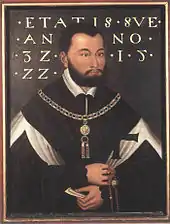1560s
The 1560s decade ran from January 1, 1560, to December 31, 1569.
| Millennium |
|---|
| 2nd millennium |
| Centuries |
| Decades |
| Years |
| Categories |
|
Events
1560
January–June
- January 7 – In the Kingdom of Scotland, French troops commanded by Henri Cleutin and Captain Corbeyran de Cardaillac Sarlabous sail across the Firth of Forth from Leith, which they are occupying, and fight with the Lords of the Congregation at Pettycur Bay near Kinghorn.
- February 27 – Treaty of Berwick: Terms are agreed upon with the Lords of the Congregation in Scotland, for forces of the Kingdom of England to enter Scotland, to expel French troops defending the Regency of Mary of Guise.[1]
- March – Bairam Khan loses power in the Mughal Empire.[2]
- March 7 – A Spanish-led expedition, commanded by Juan de la Cerda, 4th Duke of Medinaceli, overruns the Tunisian island of Djerba.[3]
- March 17 – Leaders of the Amboise conspiracy, including Godefroy de Barry, seigneur de La Renaudie, make an unsuccessful attempt to storm the château of Amboise, where the young French king and queen are residing.[4] La Renaudie is subsequently caught and executed, along with over 1,000 of his followers.[5]
- April 15 – Denmark–Norway buys the Estonian island of Ösel, from its last prince-bishop.
- May 11 – Battle of Djerba: The Ottoman fleet, commanded by Piali Pasha, overwhelms a large joint European (mainly Spanish) fleet, sinking about half its ships.[6]
- June 12 – Battle of Okehazama: Oda Nobunaga defeats Imagawa Yoshimoto.[7]
July–December
- July 6 – The Treaty of Edinburgh is signed between England, France and Scotland, ending the Siege of Leith. The French withdraw from Scotland, largely ending the Auld Alliance between the two countries, and also ending the wars between England and its northern neighbour.[8]
- August 2 – Livonian War – Battle of Ergeme: Russians defeat the Livonian Brothers of the Sword, precipitating the dissolution of the order.
- August 17 – The Scottish Reformation Parliament adopts a Protestant confession of faith and rejects papal authority, beginning the Scottish Reformation, and disestablishing Roman Catholicism in Scotland.[9][10]
- August 21 – A total eclipse of the sun is observable in Europe, which inspires Tycho Brahe's interest in astronomy.[11]
- September 29 – Eric XIV becomes King of Sweden, upon the death of his father Gustav Vasa.[12]
- December 5 – Charles IX succeeds his brother Francis as King of France. Francis's mother (Mary's mother-in-law), Catherine de' Medici, becomes regent of France.[13]
Date unknown
- The complete Geneva Bible is published.[14]
- The first tulip bulb brought to Europe is brought from Constantinople to the Netherlands (probable date).
- The first scientific society, the Academia Secretorum Naturae, is founded in Naples by Giambattista della Porta.[15]
- Solihull School is founded in the West Midlands of England.[16][17]
- The oldest surviving violin (dated inside), known as the Charles IX, is made in Cremona, in northern Italy.
- The Mongols invade and occupy Qinghai.[18]
- The great age of piracy in the Caribbean starts around this time.[19]
1561
January-June
- January 31 – The Edict of Orleans suspends the persecution of the Huguenots in France.
- March 1 – Kingston Grammar School is founded in England.
- April 14 – The citizens of Nuremberg see what appears to be an aerial battle, followed by the appearance of a large black triangular object and a large crash (with smoke) outside the city. A news notice (an early form of newspaper) is printed on April 14, describing the event.[20]
- May 8 – Madrid is declared the capital of Spain, by Philip II.[21]
- June 4
- The spire of Old St Paul's Cathedral in the City of London catches fire and crashes through the nave roof, probably as the result of a lightning strike. The spire is not rebuilt.[22]
- The nobility of Harrien-Wierland and the town of Reval (on June 6) of the Livonian Order swear allegiance to Sweden.
- June 25 – Francis Coxe, an English astrologer, is pilloried at Cheapside in London, and makes a public confession of his involvement in "sinistral and divelysh artes".[23]
- June 29 – Erik XIV is crowned King of Sweden.
July–December
- July – Arauco War: The hated encomendero Pedro de Avendaño and two other Spaniards are killed, triggering the Second Great Rebellion of the Mapuche.
- July 12 – Saint Basil's Cathedral in Moscow (started in 1534) is finished.
- August – English merchant Anthony Jenkinson arrives in Moscow on his second expedition to the Grand Duchy of Moscow.
- August 19 – Mary, Queen of Scots, is denied passage through England after returning from France. She arrives at Leith, Scotland on August 19.
- September 2 – The Entry of Mary, Queen of Scots into Edinburgh, a spectacular civic celebration for the Queen of Scotland, is marred by religious controversy.[24]
- September – Protestant reformer John Knox has a three-day debate in Maybole, Ayrshire, Scotland with Quintin Kennedy, commendator of Crossraguel Abbey, on transubstantiation. The result is inconclusive, but Kennedy is fighting a losing battle against the Reformation, which had been confirmed by the Scottish government in 1560.
- October 10 – Siege of Moji in Japan ends with the defenders retaining their position.
- October 18 – Fourth Battle of Kawanakajima: Takeda Shingen defeats Uesugi Kenshin, in the climax of their ongoing conflicts.
- November 28 – The Treaty of Vilnius is concluded during the Livonian War, between the Livonian Confederation and the Polish–Lithuanian Commonwealth. With the treaty, the non-Danish and non-Swedish part of Livonia, with the exception of the Free imperial city of Riga, subjects itself to Polish king and Grand Duke of Lithuania, Sigismund II Augustus with the Pacta subiectionis (Provisio ducalis). In turn, Sigismund grants protection from the Tsardom of Russia, and confirms the Livonian estates' traditional privileges, laid out in the Privilegium Sigismundi Augusti.
Date unknown
- Merchant Taylors' School is founded in the City of London by Sir Thomas White, Sir Richard Hilles, Emanuel Lucar, and Stephen Hales.[25]
- The first Calvinists settle in England, after fleeing Flanders.
- The Anglo-Genevan metrical psalter is published, including the Old 100th, the version of the hymn All People That on Earth Do Dwell made from Psalm 100, attributed to the probably-Scottish clergyman and biblical translator William Kethe, exiled in Geneva.[26]
- Ruy López de Segura develops modern techniques of chess playing in Spain.
- William Baldwin's Beware the Cat (written early 1553), an early example of extended fiction (specifically horror fiction) in English, is published anonymously in London. This edition appears to have been suppressed, and no copies survive.[27]
- Between 1561 and 1670, 3,229 alleged witches are executed in southwestern Germany, most by burning.
1562
January–June
- January 6 – Shane O'Neill of Tír Eoghain pleads his cause at the Palace of Whitehall in London, before Queen Elizabeth I of England, who recognises his status. He returns to Ireland on May 26, and resumes his rebellious activities by November.[28]
- January 17 – Huguenots are recognized under the Edict of Saint-Germain.
- January 18
- The Council of Trent reconvenes, after a gap of 10 years.
- Thomas Norton and Thomas Sackville's play Gorboduc is performed for the first time, before Queen Elizabeth I of England. It is the first known English tragedy, and the first English language play to employ blank verse.[29]
- March 1 – Over 80 (?) Huguenots are massacred by the ultra-Catholic Francis, Duke of Guise in Wassy-sur-Blaise, marking the start of the First War of Religion in France. Protestant forces, led by Louis I de Bourbon, Prince de Condé and Gaspard de Coligny, quickly seize control of Orléans, Rouen, and other cities throughout France.[30]
- March – English merchant Anthony Jenkinson has an audience with Ivan the Terrible in Moscow, before continuing his second expedition through the Grand Duchy of Moscow to Qazvin, capital of the Safavid dynasty in Persia.
- May 1 – Jean Ribault, French navigator, lands in Florida, and later establishes a Huguenot colony at Charlesfort on Parris Island, South Carolina.
July–December
- July 12 – Fray Diego de Landa, acting Bishop of Yucatan, burns the sacred books of the Maya.
- August – The Wiesensteig witch trial begins.
- September 20 – The Treaty of Hampton Court, between Queen Elizabeth I of England and Huguenot leader Louis, Prince of Condé, is signed.[31]
- September 22 – Maximilian, son of the Emperor Ferdinand I, succeeds as king of the Kingdom of Bohemia.
- October – Privateer John Hawkins undertakes the first of several slave trading voyages, attacking Portuguese slave ships off the West African coast and forcibly transporting the enslaved Africans onboard to Spanish colonies in the Americas to sell. Hawkins arrives at the island of Hispaniola in the Spanish West Indies, where he illicitly sells the enslaved Africans to local colonists, as his presence is technically in violation of Spanish law.[32]
- October 4 – English forces under Ambrose Dudley, 3rd Earl of Warwick, land at Le Havre to aid the Huguenots against the French Crown.[31]
- October 19 – La Herradura naval disaster: Twenty-five ships sink in a storm, and some 5,000 people are killed.
- October 26 – Rouen is captured by Royalist forces under Antoine de Bourbon, King of Navarre, who is mortally wounded.
- November 5 – Battle of Corrichie in Scotland: The rebellion of George Gordon, Earl of Huntly is crushed by James Stewart, Earl of Moray.[33]
- November 20 – Maximilian of Bohemia is elected King of the Romans.
- December 19 – Battle of Dreux: Huguenot and Catholic forces fight a bloody battle, narrowly won by the Catholic side. The official leaders of both armies are captured in the battle.[34]
Date unknown
- Mughal Emperor Akbar conquers Malwa, and its last Sultan, Baz Bahadur, flees.
- The Church of England approves the Thirty-Nine Articles of Religion, defining its doctrinal stance.[32]
- Dudley Grammar School is established, and Gresham's School is granted a royal charter, in England.
- Fausto Sozzini publishes Brevis explicatio in primum Johannis caput, originating Socinianism.
- Giacomo Barozzi da Vignola publishes Regola delli cinque ordini d'architettura (Rules of the Five Orders of Architecture);[35] in succeeding centuries it will become the most published book in architectural history.[36]
- The Pünte at Wiltshausen, a small, hand-operated ferry, which becomes a historic monument in the late 20th century, is first recorded.
- The Portuguese army is defeated at the Battle of Mulleriyawa, Sri Lanka, at the hand of the Sitawaka army commanded by Prince Tikiri Bandara (King Rajasinghe), leaving 1600 dead. This is considered the worst defeat the Portuguese have suffered up to this time.
- An arsenal in Paris explodes. As recorded by Ambroise Paré in The Workes of Ambrose Parey: "In the yeare of our Lord 1562, a quantity of this pouder [gunpowder] which was not very great, taking fire by accident in the Arcenall of Paris, caused such a tempest that the whole city shook, but it quite overturned many of the neighboring houses, and shook off the tiles and broke the windows of those which were further away; and to conclude, like a storm of lightning, it laid many here and there for dead, some lost their sight, others their hearing, and others their limbs were torn apart as if they had been rent with wild horses" (p.415).
1563
January–June
- January 25 – In Italy, Instituto Bancario San Paolo di Torino, a major financial group of Sanpaolo IMI, is founded.[37]
- February 1 – Sarsa Dengel succeeds his father Menas as Emperor of Ethiopia.
- February 18 – Francis, Duke of Guise, is assassinated while besieging Orléans.
- March 19 – The Edict of Amboise is signed at the Château d'Amboise by Catherine de' Medici, acting as regent for her son Charles IX of France, having been negotiated between the Huguenot Louis, Prince of Condé, and Anne, duc de Montmorency, Constable of France. It accords some toleration to the Huguenots, especially to aristocrats. It officially ends the first phase of the French Wars of Religion, and the combined Huguenot and royal armies then march north to besiege the English in Le Havre.
- May 25 – Elizabeth College, Guernsey is founded, by order of Queen Elizabeth I of England.
- May 30 – At Bornholm, the Danish fleet fires on the Swedish navy, leading to a Danish defeat and precipitating the Northern Seven Years' War.
July–December
- July 28 – The English surrender Le Havre to the French after a siege.
- August 13 – Northern Seven Years' War: War against the Kingdom of Sweden is declared by Denmark–Norway and the Free City of Lübeck.
- August 18 – Merchants from the Bungo Province destroy the Portuguese settlement in Yokoseura, Japan
- September 4 – Northern Seven Years' War: King Frederick II of Denmark, advancing from Halland, takes Älvsborg fortress from Sweden.
- December 4 – The Council of Trent (opened December 13, 1545) officially closes.[38] It reaffirms all major Roman Catholic doctrines, and declares the Deuterocanonical books of the Old Testament to be canonical, along with the rest of the Bible. Chapter 1, Session 24, promulgates the decree Tametsi, stipulating that for a marriage to be valid, consent (the essence of marriage) as expressed in the vows has to be given publicly before witnesses, one of whom has to be the parish priest.
1564
January–June
- January 26 – Livonian War – Battle of Ula: A Lithuanian surprise attack results in a decisive defeat of the numerically superior Russian forces.[39]
- March 25 – Battle of Angol in Chile: Spanish Conquistador Lorenzo Bernal del Mercado defeats and kills the toqui Illangulién.
- June 22 – French settlers abandon Charlesfort, the first French attempt at colonizing what is now the United States, and establish Fort Caroline in Florida.
July–December
- July – English merchant Anthony Jenkinson returns to London from his second expedition to the Grand Duchy of Moscow, having gained a considerable extension of trading rights for the English Muscovy Company.
- September 4 – The Ronneby Bloodbath takes place in Ronneby, Denmark (now in Sweden).
- September 10 – Battle of Kawanakajima in Japan: Takeda Shingen fights the forces of Uesugi Kenshin for the final time, to a draw.
- November 21 – Spanish Conquistador Miguel López de Legazpi sails from Mexico. Later, he will conquer the Philippine Islands, founding Manila.
Date unknown
- First recorded report of a 'rat king'.[40]
- approx. date – Idris Alooma starts to rule the Kanem-Bornu Empire.
- The first Scottish Psalter is published.
1565
January–June
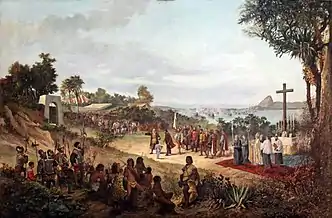
March 1: Founding of Rio de Janeiro.
- January 3 – In the Tsardom of Russia, Ivan the Terrible originates the oprichnina (repression of the boyars (aristocrats)).
- January 23 – Battle of Talikota: The Vijayanagara Empire, the last Hindu kingdom in South India, is greatly weakened by the Deccan sultanates.[41]
- February 13 – Spanish Conquistador Miguel López de Legazpi lands with his troops on the shores of Cebu Island in the Philippines.
- March 1 – The city of Rio de Janeiro, Brazil, is founded as São Sebastião do Rio de Janeiro by Estácio de Sá.[42]
- March 16 – Spanish Conquistador López de Legazpi makes a blood compact (sandugan) with Datu Sikatuna in the island of Bohol, Philippines.
- April 27 – Cebu City is established as San Miguel by López de Legazpi, becoming the first Spanish settlement in the Philippines.
- May 18 – Ottoman troops land on the island of Malta, beginning the Great Siege of Malta.
- June 4 – The Treaty of Cebu is signed between Miguel López de Legazpi, representing Philip II of Spain, and Rajah Tupas of Cebu. This effectively creates Spanish suzerainty over Cebu.
- June 17 – Matsunaga Hisahide assassinates the 13th Ashikaga shogun, Ashikaga Yoshiteru.
July–December
- July 29 – The widowed Mary, Queen of Scots, marries her half-cousin Henry Stuart, Lord Darnley, at Holyrood Palace in Edinburgh, in a Catholic ceremony.[43]
- August 6 – Sark, in the Channel Islands, is granted as a fief by Elizabeth I of England to Hellier de Carteret, Seigneur of Saint Ouen.
- August 28 (feast day of St. Augustine) – The Spanish fleet of Pedro Menéndez de Avilés first sights land in Florida.
- September 4 – The Spanish fleet of Pedro Menéndez de Avilés lands in Florida to oust the French under Jean Ribault. He later destroys the French colony of Fort Caroline.
- September 8 – St. Augustine, Florida (named after Augustine of Hippo), is established by Pedro Menéndez de Avilés, becoming the oldest surviving European settlement in the modern-day United States.
- September 11 – The Knights of Malta lift the Great Siege of Malta after four months.
- October – The first Martello tower, the Tour de Mortella, designed by Giovan Giacomo Paleari Fratino (el Fratin), is completed as part of the Genovese defence system at Mortella (Myrtle) Point, in Upper Corsica.[44]
- October 18 – Battle of Fukuda Bay: Ships belonging to the Matsura clan of Japan fail to capture a Portuguese trading carrack, in the first recorded naval battle between Japan and the West.
- December 11 – The Mariovo and Prilep rebellion occurred, the very first recorded rebellion by the Macedonian hajduks or voivode.
Date unknown
- The pencil is first documented by Conrad Gesner; it is becoming common in England.
- John Beddoes School is founded at Presteigne, Wales.
- Herlufsholm School is founded in Denmark.
- Huntingdon Grammar School is established in England.
1566
January–June
- January 7 – Pope Pius V succeeds Pope Pius IV, as the 225th pope.[45]
- February 24 – In one of the first gun assassinations in Japanese (if not world) history, Mimura Iechika is shot dead by two brothers (Endo Matajiro and Yoshijiro), sent by his rival Ukita Naoie.
- March 28 – The foundation stone of Valletta, which will become Malta's capital city, is laid by Jean Parisot de Valette, Grand Master of the Sovereign Military Order of Malta.
- April 5 – The Compromise of Nobles is presented to Margaret of Parma, Governor of the Habsburg Netherlands, but it succeeds only in delaying the beginning of the Eighty Years' War in the Netherlands.
July–December
- August 6 – The siege of Szigetvár is begun by Suleiman the Magnificent, Sultan of the Ottoman Empire. This is the Ottoman Empire at its greatest extent.
- August 10 – Beeldenstorm: Calvinists engage in widespread destruction of religious art in the Low Countries.[46] On August 25, the vandalism reaches Leiden.
- September 7 – Suleiman the Magnificent dies in his tent at the siege of Szigetvár, and Selim II succeeds him as Sultan of the Ottoman Empire.
- September 8 – The siege of Szigetvár ends in battle, with 2,300 Hungarian and Croatian defenders, including their general, Nikola Šubić Zrinski, annihilated by an army of 90,000 soldiers of the Ottoman Empire, under Sokollu Mehmed Pasha.
Date unknown
- The Spanish gold escudo, worth 16 silver reales, is first minted during the reign of Philip II of Spain.
- Pope Pius V expels most prostitutes from Rome, and the Papal States.
- Between July 19, 1566 and July 7, 1567 – The first bridge crossing the Neretva River at Mostar (in modern-day Bosnia and Herzegovina) is completed by the Ottoman Empire. The white marble bridge becomes known as Stari Most ("Old Bridge").
1567
January–June
- January – A Spanish force under the command of Captain Juan Pardo establishes Fort San Juan, in the Native American settlement of Joara. The fort is the first European settlement in present-day North Carolina.
- January 20 – Battle of Rio de Janeiro: Portuguese forces under the command of Estácio de Sá definitively drive the French out of Rio de Janeiro.
- January 23 – After 45 years' reign, the Jiajing Emperor dies in the Forbidden City of China.
- February 4 – The Longqing Emperor ascends the throne of the Ming Dynasty.
- February 10 – Henry Stuart, Lord Darnley, husband of Mary, Queen of Scots, is murdered at the Provost's House in Kirk o' Field, Edinburgh.[47]
- March 13 – Battle of Oosterweel: A Spanish mercenary army surprises and kills a band of rebels near Antwerp in the Habsburg Netherlands, beginning the Eighty Years' War.
- May 15 – Mary, Queen of Scots, marries James Hepburn, 4th Earl of Bothwell.[48]
- May 24 – Sture Murders: The mentally unstable King Erik XIV of Sweden and his guards murder five incarcerated nobles at Uppsala Castle.
- June 15 – Battle of Carberry Hill: Mary, Queen of Scots, is defeated by the Scottish nobles and imprisoned in Lochleven Castle.
July–December
- July 24 – Mary, Queen of Scots, is forced to abdicate, and replaced by her one-year-old son James VI.
- July 25 – The city of Santiago de León de Caracas is founded by Diego de Losada.
- July 29 – James VI is crowned at Stirling.
- August 22 – The Duke of Alba is sent to the Netherlands with a strong Spanish force, to suppress unrest there. He replaces Margaret of Parma as Governor of the Netherlands. Prince William of Orange is outlawed, and Lamoral, Count of Egmont imprisoned.
- September 9 – At a dinner, the Duke of Alba arrests Lamoral, Count of Egmont and Philip de Montmorency, Count of Horn for treason.
- September 27 – After the 2-week Siege of Inabayama Castle, the Oda clan capture Gifu Castle from the Saitō clan in Japan.
- September 29 – The Second War of Religion begins in France, when Louis, Prince of Condé and Gaspard de Coligny fail in an attempt to capture King Charles IX and his mother at Meaux. The Huguenots do capture several cities (including Orléans), and march on Paris.
- October 7 – Bible translations into Welsh: The New Testament is first published in Welsh, in William Salesbury's translation from the Greek.
- November 10 – Battle of Saint-Denis: Anne de Montmorency, with 16,000 Royalists, falls on Condé's 3,500 Huguenots. The Huguenots surprisingly hold on for some hours before being driven off. Montmorency is mortally wounded.[49]
Date unknown
- King Frederick II of Denmark and Norway founds Fredrikstad in Norway.
- Construction of Villa Capra "La Rotonda" in Vicenza, designed by Andrea Palladio, begins. It will be one of the most influential designs in the history of architecture.[50]
- Rugby School, one of the oldest public schools in England, is founded.
- Although sparse maritime trade existed since its founding, the Ming dynasty government of China officially revokes the haijin maritime trade ban, reinstating foreign trade with all countries except Japan.[51]
January–June
- January 6–13 – In the Eastern Hungarian Kingdom, the delegates of Unio Trium Nationum to the Diet of Torda make Europe's first declaration of religious freedom, adopted on January 28 as the Edict of Torda.
- February 17 – Treaty of Adrianople (sometimes called the Peace of Adrianople): The Habsburgs agree to pay tribute to the Ottomans.
- March 23 – The Peace of Longjumeau ends the Second War of Religion in France. Again Catherine de' Medici and Charles IX make substantial concessions to the Huguenots.
- May 2 – Mary, Queen of Scots, escapes from Lochleven Castle.
- May 13 – Battle of Langside: The forces of Mary, Queen of Scots are defeated by a confederacy of Scottish Protestants, under James Stewart, Earl of Moray, her half-brother.[52]
- May 16 – Mary, Queen of Scots, flees to England.
- May 19 – Queen Elizabeth I of England arrests Mary, Queen of Scots.
- May 23 – Battle of Heiligerlee: Troops under Louis of Nassau, brother of William I of Orange, defeat a smaller loyalist force under the Duke of Arenberg, in an attempt to invade the Northern Netherlands. This effectively begins the Eighty Years' War.[53]
July–December
- July 21 – Battle of Jemmingen: The main Spanish army of the Duke of Alba utterly defeats Louis of Nassau's invading army, in the Northeastern Netherlands.
- August 18 – The Third War of Religion begins in France, after an unsuccessful attempt by the Royalists to capture Condé and Coligny, the Huguenot leaders.
- September 24 – Battle of San Juan de Ulúa (Anglo-Spanish War): In the Gulf of Mexico, a Spanish fleet forces English privateers under John Hawkins to end their campaign.
- September 29 – The Swedish king Eric XIV is deposed by his half-brothers John and Charles. John proclaims himself king John III the next day.
- October 5 – William I of Orange invades the southeastern Netherlands.
- October 20 – Battle of Jodoigne: Spanish forces under the Duke of Alba destroy Orange's rearguard. Orange abandons his offensive.[54]
Date unknown
- The Russo-Turkish War begins in Astrakhan.
- Ashikaga Yoshiaki is installed as Shōgun, beginning the Azuchi–Momoyama period in Japan.
- Akbar the Great of the Mughal Empire besieges and captures the massive Chittor Fort, in northern India.
- Polybius' The Histories are first translated into English, by Christopher Watson.[55]
- Huguenots besiege Chartres.
- A Spanish expedition under Álvaro de Mendaña de Neira discovers the Solomon Islands.
- Álvaro I succeeds his stepfather Henrique I as ruler of the Kingdom of Kongo forming the Kwilu dynasty that ruled the kingdom without interruption until May 1622
January–June
- January 11–May 6 – The first recorded lottery in England is performed nonstop, at the west door of St Paul's Cathedral. Each share costs ten shillings, and proceeds are used to repair harbours, and for other public works.
- March 13 – Battle of Jarnac: Royalist troops under Marshal Gaspard de Tavannes surprise and defeat the Huguenots under the Prince of Condé, who is captured and murdered. A substantial proportion of the Huguenot army manages to escape, under Gaspard de Coligny.[56]
- June 10 – German Protestant troops reinforce Coligny, near Limoges.
July–December
- July 1 – The Union of Lublin unites the Kingdom of Poland and the Grand Duchy of Lithuania into a single state, the Polish–Lithuanian Commonwealth, following votes in the Assemblies of three Lithuanian provinces (Volhynia, Ukraine and Podlasie) in favour of the incorporation.
- July–September – Huguenot forces under Coligny and 15-year-old Prince Henry of Navarre besiege Poitiers.
- August 2 – Burma invades Siam and captures Ayutthaya. Siam becomes a vassal of Burma.
- August 24 – Battle of Orthez: Huguenot forces under Gabriel, comte de Montgomery defeat Royalist forces under General Terride, in French Navarre. Catholics surrender under the condition that their lives will be spared. Huguenots agree, but then massacre the Catholics anyway.[57]
- September – A Royalist army under the Duc d'Anjou and Marshal Tavannes forces Coligny to abandon the siege of Poitiers.
- September 28 – The first complete printed Bible in a Spanish translation (La Biblia), made by Casiodoro de Reina, is published in Basel.[58][59]
- October 3 – Battle of Moncontour: The Royalist forces of Tavannaes and Anjou defeat Coligny's Huguenots.
- November–December – Rising of the North in England: Three northern earls lead a rebellion against Queen Elizabeth I, in an attempt to place the Catholic Mary, Queen of Scots, on the English throne, but are driven out of the country.
Dates unknown
- The Mercator projection is first used in Gerardus Mercator's world map, Nova et Aucta Orbis Terrae Descriptio ad Usum Navigantium Emendata.[60]
- A conspiracy with the intent to depose John III of Sweden and reinstate the imprisoned Eric XIV of Sweden on the Swedish throne is exposed in Sweden.
- The trade compact of 1536 is renewed, exempting French merchants from Ottoman law, and allowing them to travel, buy and sell throughout the sultan's dominions, and to pay low customs duties on French imports and exports.
- Akbar founds Fatehpur Sikri, to honor the Muslim holy man Shaikh Salim Chisti, who has foretold the birth of Akbar's son and heir, Jahangir.
Births
1560
- January 17 – Gaspard Bauhin, Swiss botanist (d. 1624)[61]
- January 29 – Scipione Dentice, Neapolitan keyboard composer (d. 1633)[62]
- March 13 – William Louis, Count of Nassau-Dillenburg, Dutch count (d. 1620)[63]
- March 29 – Erekle I, Prince of Mukhrani, Georgian noble (d. 1605)
- April 19 – Count Jobst of Limburg (d. 1621)[64]
- May 6 – Guido Pepoli, Italian Catholic cardinal (d. 1599)[65]
- June 25 – Wilhelm Fabry, German surgeon (d. 1634)[66]
- June 28 – Giovanni Paolo Lascaris, Italian Grand Master of the Knights Hospitaller (d. 1657)
- July 1 – Charles III de Croÿ, Belgian noble (d. 1612)[67]
- July 7 – Margaret Clifford, Countess of Cumberland, English noblewoman and maid of honor to Elizabeth I (d. 1616)[68]
- August 6 – Antoine Arnauld, French lawyer (d. 1619)[69]
- August 7 – Elizabeth Báthory, Hungarian noblewoman and purported serial killer (d. 1614)[70]
- August 10 – Hieronymus Praetorius, German composer (d. 1629)[71]
- August 19 – James Crichton, Scottish polymath (d. 1582)[72]
- August 25 – Park Jin, Korean naval commander (d. 1597)
- September 4 – Charles I, Count Palatine of Zweibrücken-Birkenfeld (d. 1600)[73]
- September 19 – Thomas Cavendish, English naval explorer, leader of the third expedition to circumnavigate the globe (d. 1592)[74]
- October 10 – Jacobus Arminius, Dutch theologian (d. 1609)[75]
- October 17 – Ernest Frederick, Margrave of Baden-Durlach (d. 1604)[76]
- October 29 – Christian I, Elector of Saxony (d. 1591)[77]
- November 3 – Annibale Carracci, Italian painter (d. 1609)[78]
- November 22 – Charles, Margrave of Burgau, German nobleman (d. 1618)[79]
- November 28 – Baltasar Marradas, Count of Spain (d. 1638)[80]
- December 3 – Jan Gruter, Dutch critic and scholar (d. 1627)[81]
- December 13 – Maximilien de Béthune, Duke of Sully, 2nd Prime Minister of France (d. 1641)[82]
- December 28 – Samuel Sandys, English politician (d. 1623)[83]
- December 29 – Wolfgang Ernst I of Isenburg-Büdingen-Birstein, German count (d. 1633)[84]
- date unknown
- Felice Anerio, Italian composer (d. 1614)[85]
- Marco Antonio de Dominis, Dalmatian archbishop and apostate (d. 1624)[86]
- Amalia von Hatzfeld, Swedish countess governor (d. 1628)
- Lieven de Key, Dutch architect (d. 1627)[87]
- Ishida Mitsunari, Japanese samurai (d. 1600)
- Hugh Myddelton, Welsh businessman (d. 1631)[88]
- Anton Praetorius, German pastor (d. 1613)
- probable
- Jan Karol Chodkiewicz, Polish military commander (d. 1621)
- Adam Haslmayr, Tyrolean commentator on Rosicrucian manifestos (d. 1630)
- Ketevan the Martyr, Georgian queen and saint (d. 1624)
- Marietta Robusti, Venetian Renaissance painter (d. 1590)
1561
- January 1 – Thomas Walsingham, English literary patron (d. 1630)
- January 6 – Thomas Fincke, Danish mathematician and physicist (d. 1656)
- January 22 – Sir Francis Bacon, English philosopher, scientist, and statesman (d. 1626)[89]
- January 24 – Camillo Cortellini, Italian composer (d. 1630)
- February 1 – Henry Briggs, British mathematician (d. 1630)
- February 8 – Fujiwara Seika, Japanese philosopher (d. 1619)
- February 15 – Johannetta of Sayn-Wittgenstein, German noblewoman (d. 1622)
- February 25 – Edward Talbot, 8th Earl of Shrewsbury, English politician and earl (d. 1617)
- March 9 – Archduke Wenceslaus of Austria, Archduke of Austria (d. 1578)
- March 29 – Santorio Santorio, Italian biologist (d. 1636)
- April 8
- Thiri Thudhamma Yaza of Martaban, Viceroy of Martaban (d. 1584)
- Dominicus Baudius, Dutch historian and poet (d. 1613)
- June – Samuel Harsnett, Archbishop of York (d. 1631)
- June 7 – John VII, Count of Nassau-Siegen (d. 1623)
- June 12 – Anna of Württemberg, German princess (d. 1616)
- June 13 – Anna Maria of Anhalt, German noblewoman (d. 1605)
- June 20 (bapt.) – Richard Whitbourne, English colonist of Newfoundland (d. 1635)
- June 24 – Matthias Hafenreffer, German Lutheran theologian (d. 1619)
- June 26 – Erdmuthe of Brandenburg, Duchess of Pomerania-Stettin (d. 1623)
- July 2 – Christoph Grienberger, Austrian astronomer (d. 1636)
- July 11 – Luís de Góngora y Argote, Spanish poet (d. 1627)
- July 17 – Jacopo Corsi, Italian composer (d. 1602)
- July 24 – Maria of the Palatinate-Simmern, Duchess consort of Södermanland (1579-1589) (d. 1589)
- August 14 – Christopher Heydon, English politician (d. 1623)
- August 20 – Jacopo Peri, Italian composer (d. 1633)
- August 24
- Thomas Howard, 1st Earl of Suffolk (d. 1626)[90]
- Bartholomaeus Pitiscus, German astronomer and mathematician (d. 1613)
- August 25 – Philippe van Lansberge, Dutch astronomer (d. 1632)
- September 1 – Gervase Helwys, English murderer (d. 1615)
- September 3 – Yi Eokgi, Korean admiral (d. 1597)
- September 10 – Hernando Arias de Saavedra, Spanish colonial governor (d. 1634)
- September 21 – Edward Seymour, Viscount Beauchamp, son of Edward Seymour Sr. (d. 1612)
- September 28 – Roland Lytton, English politician (d. 1615)
- September 29 – Adriaan van Roomen, Belgian mathematician (d. 1615)
- October 11 (bapt.) – Thomas Lake, English Secretary of State to King James I (d. 1630)
- October 15 – Richard Field, English cathedral dean (d. 1616)
- October 24 – Anthony Babington, English criminal (d. 1586)
- October 27 – Mary Sidney, English writer, patroness and translator (d. 1621)[91]
- November 1 – Francesco Usper, Italian composer (d. 1641)
- November 16 – Andreas Angelus, German pastor, teacher, chronicler of the Mark of Brandenburg (d. 1598)
- December 1 – Sophie Hedwig of Brunswick-Wolfenbüttel, duchess consort of Pomerania-Wolgast (1577-1592) (d. 1631)
- December 7 – Kikkawa Hiroie, Japanese politician (d. 1625)
- December 9 – Edwin Sandys, English founder of the colony of Virginia (d. 1629)
- December 16 – Amandus Polanus, German theologian of early Reformed orthodoxy (d. 1610)
- date unknown – Stephen Bachiler, non-conformist minister and pioneer settler of New England (d. 1656)
1562
- January – Edward Blount, English publisher (d. 1632)
- January 12 – Charles Emmanuel I, Duke of Savoy (d. 1630)[92]
- January 13 – Mark Alexander Boyd, Scottish poet and soldier of fortune (d. 1601)
- January 20
- Maria of Hanau-Münzenberg, German noblewoman (d. 1605)
- Ottavio Rinuccini, Italian composer (d. 1621)[93]
- February 15
- Rascas de Bagarris, French scholar (d. 1620)
- Maeda Toshinaga, Japanese daimyō (noble) (d. 1614)
- March 27 – Jacob Gretser, German Jesuit writer (d. 1625)
- April or May – Jan Pieterszoon Sweelinck, Dutch composer (d. 1621)
- April 21 – Valerius Herberger, German theologian (d. 1627)
- April 24 – Xu Guangqi, Ming Dynasty Chinese politician, agronomist, astronomer, mathematician and lay Catholic leader (d. 1633)
- April 25 – Friedrich Wilhelm I, Duke of Saxe-Weimar, German noble (d. 1602)
- May 6 – Pietro Bernini, Italian sculptor (d. 1629)
- May 26 – James III, Margrave of Baden-Hachberg (d. 1590)
- May 28 – John William, Duke of Jülich-Cleves-Berg (d. 1609)
- June 24 – Duke François de Joyeuse, French churchman and politician (d. 1615)
- June 26 – Anne of Ostfriesland, German noble, Electress Palatine (d. 1621)
- July 25 – Katō Kiyomasa, Japanese samurai (d. 1611)
- August 17 (bapt.) – Hans Leo Hassler, German composer (d. 1612)
- August 19 – Charles II de Bourbon-Vendôme, French cardinal (d. 1594)
- September 1 – George, Count of Nassau-Dillenburg (1607-1620) and (1620-1623) (d. 1623)
- September 21 – Vincenzo Gonzaga, Duke of Mantua and Montferrat (1587-1612) (d. 1612)
- September 24 – Ercole, Lord of Monaco, Monegasque noble (d. 1604)
- October 4 – Christian Sørensen Longomontanus, Danish astronomer (d. 1647)
- October 19 – George Abbot, Archbishop of Canterbury (d. 1633)
- November 25 – Lope de Vega, Spanish poet and dramatist (d. 1635)[94]
- December 10 – Roger de Saint-Lary de Termes, French noble (d. 1646)
- December 14 – Sir Lionel Tollemache, 1st Baronet, English baronet (d. 1621)
- December 18 – Philipp Dulichius, German composer (d. 1631)
- date unknown
- Isabella Andreini, Italian actress (d. 1604)
- John Bull, English composer (d. 1628)
- Henry Constable, English poet (d. 1613)
- Samuel Daniel, English poet and historian (d. 1619)
- Francis Godwin, English writer and bishop (d. 1633)
- George Gordon, 1st Marquess of Huntly, Scottish noble (d. 1636)
- Natsuka Masaie, Japanese daimyō (noble) (d. 1600)
- Paulo Miki, Japanese Catholic saint and martyr (d. 1597)
- Richard Neile, English bishop (d. 1640)
- Henry Spelman, English antiquary (d. 1641)
- Cornelis van Haarlem, Dutch painter (d. 1638)
1563
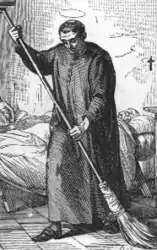
Saint Francis Caracciolo
- January – Penelope Blount, Countess of Devonshire, English noblewoman (d. 1607)
- January 6
- Johann Christoph von Westerstetten, German bishop (d. 1637)
- Martin Becanus, Belgian Jesuit priest (d. 1624)
- January 19 – Leonhard Hutter, German theologian (d. 1616)
- January 29 – William Slingsby, English army officer (d. 1634)
- January 30 – Franciscus Gomarus, Dutch theologian (d. 1641)
- March 5 – John Coke, English politician (d. 1644)
- March 29 – Sir Miles Sandys, 1st Baronet, English politician (d. 1645)
- April 15 – Guru Arjan Dev, fifth Sikh leader (d. 1606)
- May 9 – Frederick IV of Fürstenberg, German noble (d. 1617)
- June 1 – Robert Cecil, 1st Earl of Salisbury, English statesman and spymaster (d. 1612)
- June 4 – George Heriot, Scottish goldsmith and philanthropist (d. 1624)
- July 19 – Lamoral, 1st Prince of Ligne (d. 1624)
- September 4 – Wanli Emperor of China (d. 1620)
- September 15 – Elisabeth of Anhalt-Zerbst, Electress of Brandenburg (d. 1607)
- September 18 – Agnes of Limburg-Styrum, Abbess of Elten, Vreden, Borghorst and Freckenhorst (d. 1645)
- September 21 – Henri, Duke of Joyeuse, French general (d. 1608)
- September 27 – Thomas Freke, English politician (d. 1633)
- September 30 – Enno III, Count of East Frisia, Count of Ostfriesland from 1599 to 1625 from the Cirksena family (d. 1625)
- October 4 – Dorothea of Saxony, Duchess of Brunswick-Wolfenbüttel (d. 1587)
- October 13 – Francis Caracciolo, Italian Catholic priest (d. 1608)
- October 14 – Jodocus Hondius, Flemish artist (d. 1633)
- October 28 – Berlinghiero Gessi, Italian Catholic cardinal (d. 1639)
- October 30 – Sophie of Brunswick-Lüneburg, Margrave of Brandenburg-Ansbach and Brandenburg-Kulmbach, Duchess of Hunters Village (d. 1639)
- November 5 – Countess Anna of Nassau (d. 1588)
- November 8 – Henry II, Duke of Lorraine (d. 1624)
- November 19 – Robert Sidney, 1st Earl of Leicester, English statesman (d. 1626)
- November 20 – Sophie of Württemberg, German noble (d. 1590)
- November 28 – Hosokawa Tadaoki, Japanese daimyō (d. 1646)
- December 2 – Mutio Vitelleschi, Italian Superior General of the Society of Jesus (d. 1645)
- December 19 – Lord William Howard, English nobleman (d. 1640)
- December 20 – Juan Fernandez Pacheco, 5th Duke of Escalona, Spanish noble and diplomat (d. 1615)
- date unknown
- Charles Blount, 1st Earl of Devonshire (d. 1606)
- Louise Bourgeois Boursier, French Royal midwife (d. 1636)
- John Dowland, English composer (d. 1626)[95]
- Michael Drayton, English poet (d. 1631)[96]
- Scipione Gentili, Italian legal scholar (d. 1616)
- Anna Guarini, Italian virtuoso singer (d. 1598)
- Hosokawa Gracia, Japanese noblewoman (d. 1600)
- Heo Nanseolheon, Korean poet (d. 1589)
- Marcin Kazanowski, Polish nobleman (d. 1636)
- Zygmunt Kazanowski, Polish nobleman (d. 1634)
- Robert Naunton, English politician and writer (d. 1635)
- Pedro Fernandes de Queirós, Portuguese seaman and explorer (d. 1614)
- Mariana de Jesús Torres, Spanish nun and mystic (d. 1635)
- Joshua Sylvester, English poet (d. 1618)
- Jean Titelouze, French organist and composer (d. 1633)
- Yi Su-gwang, Korean scholar (d. 1628)
1564
- January 1 – Šurhaci, Chinese prince (d. 1611)
- February 15 – Galileo Galilei, Italian astronomer and physicist (d. 1642)[97]
- February 26 (baptized) – Christopher Marlowe, English dramatist and poet (d. 1593)[98]
- March 7 – Pierre Coton, French Jesuit and royal confessor (d. 1626)
- March 9 – David Fabricius, Frisian astronomer (d. 1617)[99]
- March 15 – William Augustus, Duke of Brunswick-Harburg (d. 1642)
- March 20 – Thomas Morton, English bishop (d. 1659)
- April 2 – William Bathe, Irish Jesuit priest (d. 1614)
- April 26 (baptized) – William Shakespeare, English dramatist and poet (d. 1616)[100]
- April 27 – Henry Percy, 9th Earl of Northumberland (d. 1632)
- April 30 – Francis Hay, 9th Earl of Erroll, Scottish noble (d. 1631)
- May 27 – Margherita Gonzaga, Duchess of Ferrara, Italian noble, patron of the arts (d. 1618)
- June 11 – Joseph Heintz the Elder, Swiss artist (d. 1609)
- June 12 – John Casimir, Duke of Saxe-Coburg (d. 1633)
- June 28 – Cort Aslakssøn, Norwegian astronomer (d. 1624)
- July 6 – Johanna Sibylla of Hanau-Lichtenberg, Countess consort of Wied-Runkel and Isenburg (d. 1636)
- August 18 – Federico Borromeo, Cardinal Archbishop of Milan (d. 1631)
- August 24 – Patrick Forbes, bishop in the Church of Scotland (d. 1635)
- September 13 – Vincenzo Giustiniani, Italian banker and art collector (d. 1637)
- September 24 – William Adams, English navigator and samurai (d. 1620)[101]
- September 25 – Magnus Brahe, Swedish noble (d. 1633)
- September 28 – Sibylla of Anhalt, Duchess consort of Württemberg (1593-1608). (d. 1614)
- October 15 – Henry Julius, Duke of Brunswick-Lüneburg (1589-1613) (d. 1613)
- October 26 – Hans Leo Hassler, German composer and organist (d. 1612)
- November 3 (baptized) – Francisco Pacheco, Spanish artist (d. 1644)
- November 11 – Martinus Smiglecius, Polish philosopher (d. 1618)
- November 22 – Henry Brooke, 11th Baron Cobham, English peer and traitor (d. 1618)
- November 24 – Joseph Gaultier de la Vallette, French astronomer (d. 1647)
- December 25
- Johannes Buxtorf, German Calvinist theologian (d. 1629)
- Nicolaus Mulerius, Dutch astronomer and medical academic (d. 1630)
- December 31 – Ernest II, Duke of Brunswick-Lüneburg, German ruler (d. 1611)
- approximate date – Xue Susu, Chinese artist
- date unknown
- Pieter Brueghel the Younger, Flemish painter (d. 1638)
- Daniel Chamier, French minister of religion (d. 1621)
- Kryštof Harant z Polžic a Bezdružic, Bohemian composer and Protestant rebel (d. 1621)
- Pedro Páez, Spanish Jesuit missionary to Ethiopia (d. 1622)
- Thomas Shirley, English privateer (d. c.1634)
- probable
- Henry Chettle, English dramatist (d. 1607)
1565
- January 17 – Mariana Navarro de Guevarra Romero, Spanish Roman Catholic nun, member of the Mercedarian Tertiaries (d. 1624)
- February 13 – Willem Baudartius, Dutch theologian (d. 1640)
- March 23 – Eilhard Lubinus, German theologian (d. 1621)
- April 2 – Cornelis de Houtman, Dutch explorer (d. 1599)
- April 3 – Anna III, Abbess of Quedlinburg (d. 1601)
- May 15 – Hendrick de Keyser, Dutch sculptor and architect born in Utrecht (d. 1621)
- June 2 – Francisco Ribalta, Spanish painter (d. 1628)
- July 6 – Hugh Hamersley, Lord Mayor of London, 1627–1628 (d. 1636)
- August 5 - Paola Massarenghi, Italian composer (d. unknown)
- August 9 – Louis II, Count of Nassau-Weilburg (d. 1627)
- August 16 – Christina, Grand Duchess of Tuscany (d. 1637)
- August 20 – Margaretha van Valckenburch, Dutch shipowner, only female member of the VOC (d. 1650)
- August 29 – Agostino Ciampelli, Italian painter (d. 1630)
- September 17 – Edward Fortunatus, German nobleman (d. 1600)
- September 28 – Alessandro Tassoni, Italian poet and writer (d. 1635)[102]
- October 6 – Marie de Gournay, French writer (d. 1645)
- October 12 – Ippolito Galantini, Italian founder of the Congregation of Christian Doctrine of Florence (d. 1619)
- October 22 – Benedikt Carpzov the elder, German legal scholar (d. 1624)
- November 10
- Robert Devereux, 2nd Earl of Essex, English nobleman and politician (d. 1601)[103]
- Laurentius Paulinus Gothus, Swedish theologian and astronomer (d. 1646)
- November 14 – Petrus Bertius, Flemish theologian and scientist (d. 1629)
- December 2 – Toby Caulfeild, 1st Baron Caulfeild, Northern Irish politician (d. 1627)
- date unknown
- Reza Abbasi, Persian painter and calligrapher (d. 1635)
- Gregor Aichinger, German composer (d. 1628)
- Ferdinando Gorges, English colonial entrepreneur (d. 1647)
- John Davies of Hereford, Welsh poet (d. 1618)
- George Kirbye, English composer (d. 1634)
- Duarte Lobo, Portuguese composer (d. 1646)
- Francis Meres, English churchman and author (d. 1647)
- María Pita, Spanish heroine (d. 1643)
- John Spottiswoode, Archbishop of St. Andrews (d. 1639)
- Francis Tanfield, English governor of the South Falkland colony
- Edmund Whitelocke, English soldier and courtier (d. 1608)
1566

Sultan Mehmed III
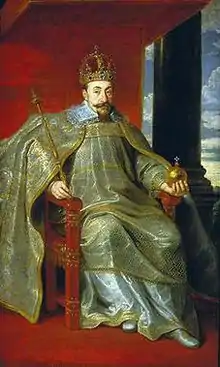
King Sigismund III Vasa
- January 13 – Maria of Brunswick-Lüneburg, Duchess Consort of Saxe-Lauenburg (1582–1619) (d. 1626)
- January 15 – Philipp Uffenbach, German artist (d. 1636)
- February 1 – Marie of the Incarnation, French Discalced Carmelite beatified nun and blessed (d. 1618)
- February 18 – Francesco Erizzo, Doge of Venice (d. 1646)
- March 1 – John Hoskins, English poet (d. 1638)
- March 8 – Carlo Gesualdo, Italian music composer (d. 1613)
- April 2 – Bartholda van Swieten, Dutch diplomat (d. 1647)
- May 26 – Mehmed III, Ottoman Sultan (d. 1603)
- June 19 – King James VI of Scotland/James I of England and Ireland (d. 1625)[104]
- June 20 – King Sigismund III Vasa, of Poland and Sweden (d. 1632)[105]
- July 9 – John Ernest, Duke of Saxe-Eisenach, German duke (d. 1638)
- August 12 – Infanta Isabella Clara Eugenia of Spain (d. 1633)
- August 24 – Abraham Scultetus, German theologian (d. 1625)
- September 1 – Edward Alleyn, English actor (d. 1626)
- October 13 – Richard Boyle, 1st Earl of Cork, Irish politician (d. 1643)
- October 15 – Sigrid of Sweden, Swedish princess (d. 1633)
- November 3 – Charles, Count of Soissons, French prince du sang and military commander (d. 1612)
- November 9 – Christian, Duke of Brunswick-Lüneburg, Prince of Lüneburt (1611–1633) (d. 1633)
- November 16 – Anna Juliana Gonzaga, Archduchess of Austria and nun (d. 1621)
- November 21 – Francesco Cennini de' Salamandri, Roman Catholic cardinal (d. 1645)
- November 25 – John Heminges, English actor (d. 1630)
- November 26 – Francesco Bracciolini, Italian poet (d. 1645)
- December 1 – Philip of Nassau, Count of Nassau (d. 1595)
- December 11 – (baptised) – Manuel Cardoso, Portuguese composer (d. 1650)
- December 19 – George Talbot, 9th Earl of Shrewsbury, English earl (d. 1630)
- December 27 – Jan Jesenius, Slovak physician (d. 1621)
- date unknown
- Pietro Cerone, Italian music theorist (d. 1625)
- Polyxena von Lobkowicz, politically active Czech aristocrat (d. 1642)
- Giovanni Baglione, Italian painter and historian of art (d. 1643)
- Michal Sedziwój, Polish alchemist (d. 1636)
- James Sempill, Scottish theologian (d. 1626)
- Lucia Quinciani, Italian composer
- Caterina Vitale, Maltese pharmacist (d. 1619)
1567
- January 1 – Fabio Colonna, Italian scientist (d. 1640)
- January 4 – François d'Aguilon, Belgian Jesuit mathematician (d. 1617)
- January 12 – Jan Szczęsny Herburt, Polish political writer (d. 1616)
- January 25 – Archduchess Margaret of Austria (d. 1633)
- January 27 – Anna Maria of Hesse-Kassel, Countess Consort of Nassau-Saarbrücke (d. 1626)
- February 3 – Anna Maria of Brandenburg, Duchess Consort of Pomerania (d. 1618)
- February 12 – Thomas Campion, English poet and composer (d. 1620)[106]
- February 23 – Elisabeth of Brunswick-Wolfenbüttel, Countess of Holstein-Schauenburg and Duchess Consort of Brunswick-Harburg (d. 1618)
- February 24 – Jindřich Matyáš Thurn, Swedish general (d. 1640)
- February 27 – William Alabaster, English poet (d. 1640)
- March 13 (bapt.) – Jacob van Heemskerk, Dutch admiral and explorer (d. 1607)
- March 17 – Akizuki Tanenaga, Japanese samurai and soldier (d. 1614)
- April 10 – John Louis I, Count of Nassau-Wiesbaden-Idstein, Germany noble (d. 1596)
- April 26 – Nicolas Formé, French composer (d. 1638)
- May 2 – Sebald de Weert, Dutch captain, vice-admiral of the Dutch East India Company (d. 1603)
- May 9 – John George I, Prince of Anhalt-Dessau (1603–1618) (d. 1618)
- May 13 – Don Giovanni de' Medici, Italian military commander and diplomat (d. 1621)
- May 15 – Claudio Monteverdi, Italian composer (d. 1643)
- June 25 – Jacob Ulfeldt, Danish politician (d. 1630)
- August 14 – Luigi Caponaro, Italian healer (d. 1622)
- August 15 – Philip III, Margrave of Baden-Rodemachern (1588–1620) (d. 1620)
- August 21 – Francis de Sales, Savoyard Bishop of Geneva and saint (d. 1622)
- September – Edward Sutton, 5th Baron Dudley, English landowner (d. 1643)
- September 2 – György Thurzó, Palatine of Hungary (d. 1616)
- September 5 – Date Masamune, Japanese daimyō (d. 1636)
- September 24 – Martin Fréminet, French painter (d. 1619)
- October 10 – Infanta Catherine Michelle of Spain (d. 1597)
- November
- Thomas Nashe, English poet (d. 1600)
- Minye Kyawswa II of Ava, last crown prince of the Toungoo Empire (Burma) (d. 1599)
- November 1 – Diego Sarmiento de Acuña, 1st Count of Gondomar, Spanish diplomat (d. 1626)
- November 7 – Margherita Farnese, Benedictine nun (d. 1643)
- November 14 – Maurice of Nassau, Prince of Orange (d. 1625)
- November 16 – Anna of Saxony, German noblewoman (d. 1613)
- November 21 – Anne de Xainctonge, French religious (d. 1621)
- December 15 – Christoph Demantius, German composer (d. 1643)
- December 18
- Cornelius a Lapide, Jesuit exegete (d. 1637)
- Tachibana Muneshige, Japanese samurai and soldier (d. 1643)
- date unknown
- Valens Acidalius, German critic and poet (d. 1595)
- Isabel Barreto, Spanish admiral (d. 1612)
- Pierre Biard, French settler and Jesuit missionary (d. 1622)
- Adriaen Block, Dutch fur trader and navigator (d. 1624)
- Jacques Clément, French assassin of Henry III of France (d. 1589)
- Arima Harunobu, Japanese Christian daimyō (d. 1612)
- John Parkinson, English herbalist and botanist (d. 1650)
- Willem Schouten, Dutch navigator (d. 1625)
- Torii Tadamasa, Japanese nobleman (d. 1628)
- Sanada Yukimura, Japanese samurai and soldier (d. 1615)
- Ban Naoyuki, Japanese samurai and soldier (d. 1615)
1568
- January 6 – Henri Spondanus, French historian (d. 1643)
- January 14 – Johannes Hartmann, German chemist (d. 1631)
- January 20 – Daniel Cramer, German theologian (d. 1637)
- January 28 – Gustav of Sweden, Swedish prince (d. 1607)
- January 30 – Countess Katharina of Hanau-Lichtenberg (d. 1636)
- February 2 – Péter Révay, Hungarian historian (d. 1622)
- February 11 – Honoré d'Urfé, French writer (d. 1625)
- March 9 – Aloysius Gonzaga, Italian Jesuit and saint (d. 1591)
- March 16 – Juan Martínez Montañés, Spanish sculptor (d. 1649)
- March 28 – Johannes Polyander, Dutch theologian (d. 1646)
- March 30 – Henry Wotton, English author and diplomat (d. 1639)
- April 5 – Pope Urban VIII (d. 1644)
- April 17 – George Brooke, English aristocrat (d. 1603)
- April 21 – Frederick II, Duke of Holstein-Gottorp (d. 1587)
- April 28 – Teodósio II, Duke of Braganza, Portuguese nobleman and father of João IV of Portugal (d. 1630)
- May 9 – Guglielmo Caccia, Italian painter (d. 1625)
- May 11 – Christian I, Prince of Anhalt-Bernburg, German prince of the House of Ascania (d. 1630)
- May 17 – Anna Vasa of Sweden, Swedish princess (d. 1625)
- May 29 – Virginia de' Medici, Duchess of Modena and Reggio (d. 1615)
- June 6 – Sophie of Brandenburg, Regent of Saxony (1591–1601) (d. 1622)
- June 25 – Gunilla Bielke, Queen of Sweden (d. 1597)
- July 1 – Philip Sigismund of Brunswick-Wolfenbüttel, German Catholic bishop (d. 1623)
- August 27 – Hercule, Duke of Montbazon (d. 1654)
- September 3 – Adriano Banchieri, Italian composer (d. 1634)
- September 5 – Tommaso Campanella, Italian theologian and poet (d. 1639)[107]
- October 2 – Marino Ghetaldi, Croatian mathematician and physicist (d. 1626)
- October 18 – Henry Wallop, English politician (d. 1642)
- November 18 – Augustus the Elder, Duke of Brunswick-Lüneburg, Lutheran Bishop of Ratzeburg (d. 1636)
- December 17 – Jonathan Trelawny, English politician (d. 1604)
- December 25 – John Guy, English merchant venturer and first Governor of Newfoundland (d. 1629)
- date unknown
- Nikolaus Ager, French botanist (d. 1634)
- John Welsh of Ayr, Scottish Presbyterian leader
- Barnabe Barnes, English poet (d. 1609)
- Edward Chichester, 1st Viscount Chichester (d. 1648)
- Nakagawa Hidemasa, Japanese military leader (d. 1592)
- Fernando de Alva Cortés Ixtlilxóchitl, Mexican historian (d. 1648)
- Gervase Markham, English poet and writer (d. 1637)
- Edward Somerset, 4th Earl of Worcester (d. 1628)
- Robert Wintour, English conspirator (executed 1606)
- Wei Zhongxian, Grand Secretary of China (d. 1627)
- Ōtsu Ono, Japanese woman poet, koto, and writer (believed to have learned how to write from Nobutada Konoe) (d. 1568)
1569
- January 20 – Heribert Rosweyde, Jesuit hagiographer (d. 1629)
- January 22 – Lucio Massari, Italian painter (d. 1633)
- February 13 – Johann Reinhard I, Count of Hanau-Lichtenberg (d. 1625)
- March 28 – Ranuccio I Farnese, Duke of Parma (d. 1622)
- April 10 – Countess Emilia of Nassau, German countess (d. 1629)
- April 15 – Joan Shakespeare, William Shakespeare's sister (d. 1646)
- April 16 – John Davies, English poet and lawyer (d. 1626)
- May 20 – Juan de la Cerda, 6th Duke of Medinaceli, Spanish noble (d. 1607)
- June 1 – Sophia of Holstein-Gottorp, Regent of Mecklenburg-Schwerin (1603–1608) (d. 1634)
- June 30 – Hedwig of Hesse-Kassel, countess consort of Schaumburg (d. 1644)
- July 3 – Thomas Richardson, English politician and judge (d. 1635)
- July 19 – Conrad Vorstius, Dutch theologian (d. 1622)
- July 30 – Karl I, Prince of Liechtenstein (d. 1627)
- August 31 – Jahangir, Mughal emperor (d. 1627)[108]
- September – Arthur Lake, English bishop, a translator of the King James Bible (d. 1626)
- September 5 – Georg Friedrich of Hohenlohe-Neuenstein-Weikersheim, officer and amateur poet (d. 1645)
- September 9 – Joachim Andreas von Schlick, Czech leader (d. 1621)
- September 23 – Tachibana Ginchiyo, female samurai leader of the Tachibana clan in Japan (d. 1602)
- September 24 – Ernst of Schaumburg, Count of Holstein-Pinneberg and Schaumburg (1601–1622) (d. 1622)
- September 27 – John Percy, English priest (d. 1641)
- October 13 – Claude de Bullion, French Minister of Finance (d. 1640)
- October 14 – Giambattista Marino, Italian poet (d. 1625)
- November 5 – Nils Turesson Bielke, Swedish politician (d. 1639)
- November 11 – Martin Ruland the Younger, German alchemist (d. 1611)
- November 16 – Paul Sartorius, German composer (d. 1609)
- November 18 – Antonio Marcello Barberini, Italian cardinal and the younger brother of Maffeo Barberini (d. 1646)
- November 24 – Francis Ashley, English politician (d. 1635)
- December 15 – Muzio Oddi, Italian mathematician (d. 1639)
- December 18 – Jakob Hassler, German composer (d. 1622)
- December 22 – Étienne Martellange, French architect (d. 1641)
- December 31 – Anna de' Medici, Tuscan princess (d. 1584)
- date unknown
- Guillén de Castro y Bellvis, Spanish dramatist (d. 1631)
- Tobias Hume, English composer (d. 1645)
- William Monson, British admiral (d. 1643)
- Frans Pourbus the Younger, Flemish painter (d. 1622)
- John Suckling, English politician (d. 1627)
- Yodo-dono, Japanese concubine of Toyotomi Hideyoshi (d. 1615)
Deaths
1560

King Gustavus I of Sweden

King Francis II of France
- January 1 – Joachim du Bellay, French poet (b. 1522)[109]
- January 8 – Jan Łaski, Polish Protestant evangelical reformer (b. 1499)
- January 22 – Wang Zhi, Chinese pirate
- February 7 – Bartolommeo Bandinelli, Florentine sculptor (b. 1493)[110]
- February 14 – Philip I, Duke of Pomerania-Wolgast (b. 1515)
- February 16 – Jean du Bellay, French cardinal and diplomat (b. 1493)
- March 5 – Pedro Pacheco de Villena, Spanish Catholic cardinal (b. 1488)
- April 19 – Philip Melanchthon, German humanist and reformer (b. 1497)[111]
- June 11 – Mary of Guise, queen of James V of Scotland and regent (b. 1515)[112]
- June 12
- Imagawa Yoshimoto, Japanese daimyō (b. 1519)
- Ii Naomori, Japanese warrior (b. 1506)
- August 4 – Maeda Toshimasa, Japanese samurai
- August 7 – Anastasia Romanovna, Tsarina of Russia, married to Russian Tsar Ivan the Terrible (b. 1530)
- September 8 – Amy Robsart, English noblewoman (b. 1532)
- September 14 – Anton Fugger, German merchant (b. 1493)
- September 29 – King Gustav I of Sweden (b. 1496)[113]
- September 30 – Melchor Cano, Spanish theologian (b. 1525)
- November 7 – Petrus Lotichius Secundus, German Neo-Latin poet (b. 1528)
- November 25 – Andrea Doria, Italian naval commander (b. 1466)[114]
- December 2 – Georg Sabinus, German writer (b. 1508)
- December 5 – King Francis II of France (b. 1544)[115]
- December 7 – Ernest of Bavaria, pledge lord of the County of Glatz (b. 1500)
- Date unknown – Benvenida Abrabanel, philanthropist and businesswoman.
1561
- January 9 – Amago Haruhisa, Japanese samurai and warlord (b. 1514)
- January 13 – Frederick Magnus I, Count of Solms-Laubach, (b. 1521)
- January 31
- Menno Simons, Anabaptist religious leader and Mennonite founder (b. 1496)
- Bairam Khan, Turkoman noble and poet (assassinated)
- February 13 – Francis I, Duke of Nevers (b. 1516)
- February 26 – Jorge de Montemor, Spanish writer (b. 1520)
- March 6 – Gonçalo da Silveira, Portuguese Jesuit missionary (b. 1526)
- March 24 – Giulio d'Este, illegitimate son of Italian noble (b. 1478)
- March 25 – Conrad Lycosthenes, humanist and encyclopedist (b. 1518)
- March 28 – Bartholomeus V. Welser, German banker (b. 1484)
- April 9 – Jean Quintin, French priest, knight and writer (b. 1500)[116]
- May 4 – Karl I, Prince of Anhalt-Zerbst, German prince (b. 1534)
- May 16 – Jan Tarnowski, Polish noble (b. 1488)
- June 23 – Saitō Yoshitatsu, Japanese daimyō (b. 1527)
- June 6 – Ridolfo Ghirlandaio, Italian painter (b. 1483)
- July 9 – Sebald Heyden, German musicologist and theologian (b. 1499)
- July 19 – Henry Lauder, Lord St Germains, Lord Advocate of Scotland
- September 1 – Edward Waldegrave, English politician and recusant
- September 25 – Sehzade Bayezid, Ottoman Prince (b. 1525)
- October 27 – Lope de Aguirre, Basque rebel and conquistador (b. 1510)
- November 7 – Jeanne de Jussie, Swiss nun and writer (b. 1503)
- November 11 – Hans Tausen, Danish reformer (b. 1494)
- December 6 – Joachim I, Prince of Anhalt-Dessau, German prince (b. 1509)
- December 10 – Caspar Schwenckfeld, German theologian
- date unknown
- Marie Dentière, Genevan Protestant reformer and theologian (b. 1495)
- Claude Garamond, French publisher (b. 1480)
- Ijuin Tadaaki, Japanese noble (b. 1520)
- probable – Luis de Milán, Spanish composer (b. 1500)
1562
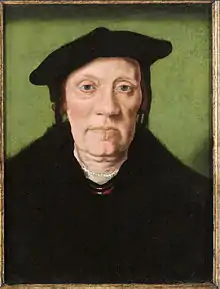
Cornelis Aerentsz van der Dussen by Jan van Scorel Panel, Weiss Gallery, London
- January – Prince Ilie II Rareş of Moldavia (b. 1531)
- January 9 – Amago Haruhisa, Japanese samurai and warlord (b. 1514)
- January 25 – Charles Wriothesley, English officer of arms (b. 1508)
- February 3 – Georg Giese, German merchant (b. 1497)
- May 4 – Lelio Sozzini, Italian Protestant theologian (b. 1525)
- July 1 – Wilhelm IV of Eberstein, German President of the Reichskammergericht (b. 1497)
- July 4 – Johann Hommel, German astronomer and mathematician (b. 1518)
- July 23 – Götz von Berlichingen, German knight and mercenary (b. 1480)
- September 5 – Katharina Zell, German Protestant reformer (b. 1497)
- October – George Gordon, 4th Earl of Huntly (b. 1514)
- October 9 – Gabriele Falloppio, Italian anatomist (b. 1523)[117]
- October 13 – Claudin de Sermisy, French composer (b. 1495)
- October 18 – Anne d'Alençon, French noblewoman (b. 1492)
- November 7 – Maldeo Rathore, Rao of Marwar (b. 1511)
- November 12 – Pietro Martire Vermigli, Italian theologian (b. 1500)
- November 17 – Antoine de Bourbon, father of Henry IV of France (b. 1518)
- November 20 – Giovanni de' Medici, Italian Catholic cardinal (b. 1544)
- December 6
- Jan van Scorel, Dutch painter (b. 1495)
- Garzia de' Medici, Italian noble (b. 1547)
- December 7 – Adrian Willaert, Flemish composer (b. c. 1490)
- December 13 – Francesco Marinoni, Italian Catholic priest (b. 1490)
- December 17 – Eleonora di Toledo, Grand Duchess of Tuscany (b. 1522)
- December 27 – Joachim of Münsterberg-Oels, Duke of Münsterberg, Duke of Oels, Count of Kladsko, Bishop of Brandenburg (b. 1503)
- date unknown
- Cristóbal de Guzmán Cecetzin, Tlatoani of Tenochtitlan and Governor of San Juan Tenochtitlan
- Matteo Bandello, Italian novelist (b. 1480)
- Nicholas Grimald, English poet and theologian (b. 1519)
1563
- January 4 – Elisabeth of Hesse, Countess Palatine of Zweibrücken, later Countess Palatine of Simmern (b. 1503)
- February 1 – Emperor Menas of Ethiopia (fever) (b. 1559)[118]
- February 4 – Wilhelm von Brandenburg, Archbishop of Riga (b. 1498)
- February 24 – Francis, Duke of Guise, French soldier and politician (shot) (b. 1519)
- March 2 – Ercole Gonzaga, Spanish Catholic cardinal (b. 1505)
- March 17 – Girolamo Seripando, Italian Catholic cardinal (b. 1493)
- March 19 – Arthur Brooke, English poet
- March 24 – Hosokawa Harumoto, Japanese military leader (b. 1514)
- March 28 – Heinrich Glarean, Swiss music theorist (b. 1488)
- April 15 – Bernhard VIII, Count of Lippe (b. 1527)
- April 30 – Henry Stafford, 1st Baron Stafford, English baron (b. 1501)
- May 21 – Martynas Mažvydas, author of the first printed book in Lithuanian (b. 1510)
- June 9 – William Paget, 1st Baron Paget, English statesman (b. 1506)
- June 24 – Prince Yuri of Uglich (b. 1532)
- August 11 – Bartolomé de Escobedo, Spanish composer (b. 1500)
- August 18 – Étienne de La Boétie, French judge and writer (b. 1530)
- August 30 – Wolfgang Musculus, German theologian (b. 1497)
- September 17 – Henry Manners, 2nd Earl of Rutland, English soldier (b. 1526)
- October 31 – Anthony Kitchin, British bishop (b. 1471)
- November
- John Bale, English churchman (b. 1495)[119]
- Ioan Iacob Heraclid, ruler of Moldavia (b. 1511)
- December 1 – Yi Gwang-sik, Korean politician and general (b. 1493)
- December 29
- Sebastian Castellio, French theologian (b. 1515)
- Thomas Naogeorgus, German playwright (b. 1508)
- date unknown
- Odet de Selve, French diplomat (b. c. 1504)
- Elizabeth Seymour, Marchioness of Winchester, English noblewoman (b. 1513)
1564
- January 9 – Margaret Howard, Duchess of Norfolk (b. 1540)
- February 18 – Michelangelo, Italian artist, architect and sculptor (b. 1475)[120]
- February 19 – Guillaume Morel, French classical scholar (b. 1505)
- March 27 – Lütfi Pasha, Albanian-born Ottoman statesman, juridical scholar and poet of slave origin (b. c.1488)
- April – Pierre Belon, French naturalist (b. 1517)
- April 9 – Georg Hartmann, German instrument maker (b. 1489)
- May 2 – Cardinal Rodolfo Pio da Carpi, Italian humanist (b. 1500)
- May 27 – John Calvin, French Protestant reformer (b. 1509)[121]
- June 24 – Rani Durgavati, Indian queen (b. 1524)
- July 23 – Eléanor de Roucy de Roye, French noble (b. 1535)
- July 25 – Ferdinand I, Holy Roman Emperor (b. 1503)[122]
- July 31 – Luís de Velasco, Viceroy of New Spain (b. 1511)
- August 10 – Miyoshi Nagayoshi, Japanese samurai and daimyō (b. 1522)
- August 30 – Duchess Sabina of Bavaria (b. 1492)
- October 5 – Pierre de Manchicourt, Flemish composer
- October 6 – Guido Ascanio Sforza di Santa Fiora, Italian Catholic cardinal (b. 1518)
- October 15 – Andreas Vesalius, Flemish anatomist (b. 1514)[123]
- October 18 – Johannes Acronius Frisius, German physician and mathematician (b. 1520)
- December 6 – Ambrosius Blarer, influential German reformer in southern Germany and north-eastern Switzerland (b. 1492)
- date unknown
- Isabella Losa, Spanish scholar (b. 1491)
- Giovanni da Udine, Italian painter (b. 1487)
- Purandara Dasa, Indian musician (b. 1484)
- Argula von Grumbach, German Protestant reformer (b. 1490)
- Charles Estienne, French anatomist (b. 1503)
- Isabella de Luna, Spanish-Italian courtesan
- Manus O'Donnell, Irish leader
- probable – Maurice Scève, French poet (b. 1500)
1565
- January 19 – Diego Laynez, Spanish Jesuit theologian (b. 1512)
- January 28 – Francisco Cesi, Italian Catholic cardinal (b. 1500)
- February 28 – John, Duke of Münsterberg-Oels and Count of Glatz (b. 1509)
- March 17 – Alexander Ales, Scottish theologian (b. 1500)
- c. March – Lope de Rueda, Spanish dramatist (b. c. 1510)
- April 2 – Elisabeth Parr, Marchioness of Northampton, English noble (b. 1526)
- April 27 – Osanna of Cattaro, Dominican visionary and anchoress (b. 1493)
- May 14 – Nicolaus von Amsdorf, German Protestant reformer (b. 1483)
- May 5 – Queen Munjeong, Korean queen (b. 1501)
- May 28 – Mikołaj "the Black" Radziwiłł, Polish magnate (b. 1515)
- June 12 – Adrianus Turnebus, French classical scholar (b. 1512)
- June 17 – Ashikaga Yoshiteru, Japanese shogun (b. 1536)
- June 19 – Wolfgang Lazius, Austrian historian (b. 1514)
- June 23 – Turgut Reis, Ottoman naval commander (b. 1485)
- July 18 – Kat Ashley, governess of Elizabeth I of England
- August – Jacques Buus, Flemish composer and organist (b. 1500)
- August 29 – Alfonso Carafa, Italian cardinal (b. 1540)
- June 25 – Herluf Trolle, Danish Admiral of the Fleet and co-founder of Herlufsholm School (b. 1516)
- September 13 – William Farel, French evangelist (b. 1489)
- September 20 – Cipriano de Rore, Flemish composer and teacher (b. 1515)
- October 4 – Pier Paolo Vergerio, Italian reformer (b. 1498)
- October 5 – Lodovico Ferrari, Italian mathematician (b. 1522)
- October 7 – Johannes Mathesius, German theologian (b. 1504)
- October 12 – Jean Ribault, French explorer and colonizer (b. 1520)
- October 14 – Thomas Chaloner, English statesman and poet (b. 1521)
- October 21 – John Frederick III, Duke of Saxony and nominal Duke of Saxe-Gotha (b. 1538)
- October 22 – Jean, Vicomte d'Aguisy Grolier de Servieres, French bibliophile (b. 1479)
- October 29 – Ranuccio Farnese, Italian prelate (b. 1530)
- November 2 – Mechthild of Bavaria, German duchess (b. 1532)
- November 25 – Hu Zongxian, Chinese general (b. 1512)
- December 9 – Pope Pius IV (b. 1499)[124]
- December 12 – Johan Rantzau, German general (b. 1492)
- December 13 – Conrad Gessner, Swiss naturalist (b. 1516)
- date unknown
- Antonio Bernieri, Italian painter of the Renaissance period (b. 1516)
- Yadegar Mokhammad of Kazan, last khan of Kazan Khanate
- Paweł Tarło, canon of Kraków, Poland
1566

Sultan Suleiman the Magnificent
- January 6 – Francesco Gonzaga, Spanish Catholic cardinal (b. 1538)
- January 7 – Louis de Blois, Flemish mystical writer (b. 1506)
- February 3 – George Cassander, Flemish theologian (b. 1513)
- February 24 – Mimura Iechika, Japanese warlord (b. 1517)
- March 9 – David Rizzio, Italian secretary of Mary, Queen of Scots (b. 1533)[125]
- March 23 – Wolfgang, Prince of Anhalt-Köthen, German prince (b. 1492)
- March 26 – Antonio de Cabezón, Spanish composer and organist (b. 1510)
- March 28 – Sigismund von Herberstein, Austrian diplomat (b. 1486)
- April 25 – Diane de Poitiers, mistress of King Henry II of France (b. 1499)[126]
- April 25 – Louise Labé, French poet (b. c. 1524)
- May 10 – Leonhart Fuchs, German physician and a botanist (b. 1501)
- July 2 – Nostradamus, French astrologer (b. 1503)
- July 13 – Thomas Hoby, English diplomat and translator (b. 1530)
- July 18 – Bartolomé de las Casas, Spanish priest (b. 1484)
- July 30 – Guillaume Rondelet, French doctor (b. 1507)
- August 19 – Elisabeth of Brunswick-Calenberg, Countess of Henneberg (b. 1526)
- September 2 – Taddeo Zuccari, Italian painter (b. 1529)
- September 6 – Suleiman the Magnificent, Ottoman Sultan since 1520 (b. 1494)
- September 17 – Íñigo López de Mendoza, 4th Duke of the Infantado (b. 1493)
- September 22 – Johannes Agricola, German Protestant reformer (b. 1494)
- September 27 – Marco Girolamo Vida, Italian poet (b. 1490)
- October 13 – Zilia Dandolo, Venetian dogaressa
- October 28 – Johann Funck, German theologian (b. 1518)
- October 31 – Richard Edwardes, English poet (b. 1523)
- November 2 – Thomas White, English politician (b. 1507)
- November 17 – Annibale Caro, Italian poet and Knight of Malta (b. 1507)
- November 27 – Froben Christoph of Zimmern, author of the Zimmern Chronicle (b. 1519)
- December 1 – Francisco Mendoza de Bobadilla, Spanish Catholic cardinal (b. 1508)
- December 14 – René, Marquis of Elbeuf (b. 1536)
- December 26 – Kimotsuki Kanetsugu, Japanese samurai (b. 1511)
- December 28 – Margaret Paleologa, Sovereign Marchioness of Montferrat (1531–1540) (b. 1510)
- date unknown
- Charles Dumoulin, French jurist (b. 1500)
- Calvagh O'Donnell, Irish chieftain
- probable - Jacob Acontius, Swiss jurist, theologian, philosopher and engineer (b. 1492)
1567
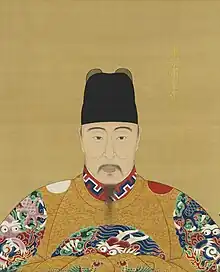
Emperor Jiajing
- January 12 – Eva von Trott, German noble and courtier (b. 1505)
- January 17 – Sampiero Corso, Corsican mercenary leader (b. 1498)
- January 23 – Jiajing Emperor of China (b. 1507)
- January 26 – Nicholas Wotton, English diplomat (c. b. 1497)
- February 10 – Henry Stuart, Lord Darnley, consort of Mary, Queen of Scots (b. 1545)
- February 20 – Estácio de Sá, Portuguese officer, founder of Rio de Janeiro (b. 1520)
- March 31 – Philip I, Landgrave of Hesse (b. 1504)
- April 1 – Jan Krzysztof Tarnowski, Polish nobleman (b. 1537)
- April 2 – Ernest III, Duke of Brunswick-Grubenhagen (b. 1518)
- April 18 – Wilhelm von Grumbach, German adventurer (b. 1503)
- April 19 – Michael Stifel, German mathematician (b. 1487)
- May 2 – Marin Držić, Croatian writer (b. 1508)
- June 2 – Shane O'Neill, Irish chieftain (b. 1530)
- June 12 – Richard Rich, Lord Chancellor of England (b. 1490)
- June 19 – Anna of Brandenburg, Duchess of Mecklenburg-Güstrow (b. 1507)
- August 3 – Myeongjong of Joseon, ruler of Korea (b. 1534)
- August 18 – Enea Vico, Italian engraver (b. 1523)
- October 1 – Pietro Carnesecchi, Italian humanist (b. 1508)
- October 31 – Marie of Brandenburg-Kulmbach, Princess of Brandenburg-Kulmbach and by marriage Electress Palatine (b. 1519)
- November 12 – Anne de Montmorency, Constable of France (b. 1493)
- November 13 – Pedro de la Gasca, viceroy of Peru (b. 1485)
- November 19 – Takeda Yoshinobu, Japanese daimyō (b. 1538)
- date unknown
- Thomas Beccon, English Protestant reformer (b. 1511)
- Péter Erdődy, ban of Croatia (b. 1504)
- Shahghali, khan of Qasim (b. 1505)
- Lawrence Sheriff, English gentleman and grocer to Elizabeth I (b. 1510)
- Akagawa Motoyasu, Japanese samurai
1568
- January 26 – Lady Catherine Grey, Countess of Hertford (b. 1540)[127]
- February 15 – Hendrick van Brederode, Dutch reformer (b. 1531)
- March 20
- Albert, Duke of Prussia (b. 1490)
- Anna Marie of Brunswick-Lüneburg, Duchess of Prussia (b. 1532)
- March 19 – Elizabeth Seymour, Lady Cromwell, English noblewoman (b.c. 1518))
- May 23 – Adolf of Nassau, Count of Nassau, Dutch soldier (b. 1540)
- April 7 – Onofrio Panvinio, Italian Augustinian historian (b. 1529)
- April 27 – Giovanni Michele Saraceni, Italian Catholic cardinal (b. 1498)
- May 6 – Bernardo Salviati, Italian Catholic cardinal (b. 1508)
- May 15 – Anna of Lorraine (b. 1522)
- May 23 – Jean de Ligne, Duke of Arenberg (b. 1528)
- June 3 – Andrés de Urdaneta, Spanish explorer (b. 1508)
- June 5
- Lamoral, Count of Egmont, Flemish statesman (b. 1522)
- Philip de Montmorency, Count of Horn (b. c. 1524)
- June 11 – Henry V, Duke of Brunswick-Lüneburg and Prince of Wolfenbüttel 1514–1568 (b. 1489)
- July 1 – Levinus Lemnius, Dutch writer (b. 1505)
- July 6 – Johannes Oporinus, Swiss printer (b. 1507)
- July 7 – William Turner, British ornithologist and botanist (b. 1508)
- July 24 – Carlos, Prince of Asturias, son of Philip II of Spain (b. 1545)
- August 15 – Stanislaus Kostka, Polish saint (b. 1550)
- August 21 – Jean Parisot de Valette, 49th Grandmaster of the Knights Hospitaller (b. 1495)
- August 23 – Thomas Wharton, 1st Baron Wharton (b. 1495)
- September 26 – Leonor de Cisneros, Spanish Protestant (b. 1536)
- September – Anna Pehrsönernas moder, influential Swedish courtier (b. year unknown)
- September – Jöran Persson, Swedish politician (b. c. 1530) (executed)
- October 3 – Elisabeth of Valois, Queen of Philip II of Spain (b. 1545)[128]
- October 14 – Jacques Arcadelt, Flemish composer (b. 1504)
- October 19 – Joannes Aurifaber Vratislaviensis, German theologian (b. 1517)
- October 28 – Ashikaga Yoshihide, Japanese shōgun (b. 1538)
- November 6
- November 9 – John Radcliffe, English politician (b. 1539)
- Herman of Kazan and Svyazhsk, Archbishop of Kazan and later Metropolitan of Moscow
- Anna of Brunswick-Lüneburg, duchess consort of Pomerania (b. 1502)
- December 23 – Roger Ascham, tutor of Elizabeth I of England (b. 1515)
- December 24 – Henry V, Burgrave of Plauen (b. 1533)
- December 28 – Christoph, Duke of Württemberg (b. 1515)
- December 31 – Shimazu Tadayoshi, Japanese warlord (b. 1493)
- date unknown
- Henry Sutton Dudley, English soldier and sailor (b. 1517)
- Garcia de Orta, Portuguese Jewish physician (b. 1501)
- Dirk Philips, early Dutch Anabaptist writer and theologian (b. 1504)
- Yan Song, Chinese prime minister (b. 1481)
- Amato Lusitano, Portuguese physician (b. 1511)
1569
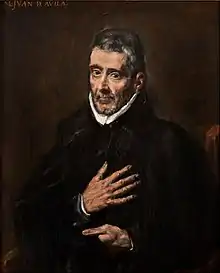
Saint John of Ávila
- January 15 – Catherine Carey lady-in-waiting to Elizabeth I of England (b. 1524)
- January 20 – Myles Coverdale, English Bible translator (b. c. 1488)[129]
- March 13 – Louis, Prince of Condé, French Protestant general (b. 1530)[56]
- March 17 – Karl Christoph, Duke of Münsterberg (b. 1545)
- April 15 –Maha Chakkraphat, Siamese King of the Ayutthaya Kingdom (b. 1509)
- May 10 – John of Ávila, Spanish mystic and saint (b. 1500)
- May 16 – Dirk Willems, Dutch Anabaptist martyr
- May 17 – Georg, Count Palatine of Simmern-Sponheim (b. 1518)
- May 26 – Vidus Vidius, Italian surgeon and anatomist (b. 1509)
- May 27 – François de Coligny d'Andelot, French general (b. 1521)
- June 11 – Wolfgang, Count Palatine of Zweibrücken (b. 1526)
- September 5
- Edmund Bonner, Bishop of London (b. c. 1500)
- Bernardo Tasso, Italian courtier and poet (b. 1493)
- September 9 – Pieter Bruegel the Elder, Flemish painter[130]
- September 11 – Vincenza Armani, Italian actress (b. 1530)
- October 3 – Philibert, Margrave of Baden-Baden (b. 1536)
- October 9 – Vladimir of Staritsa, Russian prince (b. 1533)
- October 28 – Ludovica Torelli, Count of Guastalla (b. 1500)
- November 24 – Celio Secondo Curione, Italian humanist (b. 1503)
- November 29 – António Ferreira, Portuguese poet (b. 1528)
- December 10 – Paul Eber, German Lutheran theologian (b. 1511)
- December 15 – Ludowika Margaretha of Zweibrücken-Bitsch, spouse of Count Philip V of Hanau-Lichtenberg (b. 1540)
- December 23 – Philip II, Metropolitan of Moscow (b. 1507)
- date unknown – Janet Beaton, Scottish noble (b. 1519)
- Elin Andersdotter, Swedish lady-in-waiting and political conspirator
- Gracia Mendes Nasi, Ottoman businessperson and philanthropist (b. 1510)
- Mahinthrathirat, Ayutthaya king (b. 1539)
References
- Huguenot Society of London (1965). Proceedings of the Huguenot Society of London. Huguenot Society of London. p. 633.
- Richards, John F. (1993). The Mughal Empire. Cambridge University Press. p. 14. ISBN 978-0-521-56603-2. Retrieved 22 October 2023.
- "Juan de la Cerda y Silva". dbe.rah.es. Retrieved 20 October 2023.
- Boisson, Didier; Daussy, Hugues (2006). Les Protestants dans la France moderne (in French). Belin. p. 117. ISBN 978-2-7011-3334-8. Retrieved 20 October 2023.
- Pitts, Vincent J. (5 January 2009). Henri IV of France: His Reign and Age. JHU Press. p. 17. ISBN 978-0-8018-9027-7. Retrieved 20 October 2023.
- Glete, Jan (4 January 2002). Warfare at Sea, 1500-1650: Maritime Conflicts and the Transformation of Europe. Routledge. p. 103. ISBN 978-1-134-61078-5. Retrieved 20 October 2023.
- Kodansha Encyclopedia of Japan. Kodansha. 1983. p. 83. ISBN 978-0-87011-626-1.
- Great Britain. Public Record Office (1966). Calendar of State Papers: Foreign Series, of the Reign of Elizabeth ... p. 174.
- "Records of the Parliaments of Scotland". www.rps.ac.uk. Retrieved 21 October 2023.
- Burnet, George B. (1960). The holy communion in the reformed Church of Scotland, 1560-1960. Edinburgh, Oliver and Boyd. p. 1. Retrieved 21 October 2023.
- The Observatory. London: Taylor and Francis. 1890. p. 397. Retrieved 21 October 2023.
- Rudbeck, Ture Gustaf (1855). Försök till beskrifning öfver Sveriges städer i historiskt, topografiskt och statistiskt hänseende (in Swedish). Albert Bonniers förlag. p. 16. Retrieved 21 October 2023.
- Isidore Silver (1961). Ronsard and the Hellenic Renaissance in France. Librairie Droz. p. 382. ISBN 978-2-600-03094-6.
- Metzger, Bruce M. (1960). "The Geneva Bible of 1560". Theology Today. 17 (3): 339–352. doi:10.1177/004057366001700308. S2CID 170946047. Retrieved 22 October 2023.
- Bergin, Thomas G., ed. (1987). Encyclopedia of the Renaissance. Oxford; New York: New Market Books.
- Independent schools yearbook : 1997/98 boys' schools, girls' schools, co-educational schools & preparatory schools. London: A & C Black. 1997. p. 329. ISBN 978-0-7136-4752-5. Retrieved 22 October 2023.
- "Our History". solsch.org.uk. Retrieved 22 October 2023.
- Paludan, Ann (24 March 2009). Chronicle of the Chinese Emperors: The Reign-by-reign Record Of The Rulers Of Imperial China. WW Norton. p. 182. ISBN 978-0-500-28764-4. Retrieved 22 October 2023.
- Narayan, S. S. (2009). Sea Pirates. Sumit Enterprises. p. 8. ISBN 978-81-8420-167-3. Retrieved 22 October 2023.
- "Himmelserscheinung über Nürnberg" [Celestial phenomenon over Nuremberg]. NEBIS (in German). Zurich Library. April 14, 1561. (2 pages).
- Claudia Winn Sieber (1985). The Invention of a Capital: Philip II and the First Reform of Madrid. Johns Hopkins University. p. 59.
- Caroline Allen; Edward Earl of Wessex (1999). Edward Wessex's Crown and Country: A Personal Guide to Royal London. HarperCollins. p. 62. ISBN 978-0-00-414071-1.
- "BBC History Magazine vol 12 no 6 (June 2011), p13". Archived from the original on November 9, 2014. Retrieved November 9, 2014.
- A. R. MacDonald, 'The Triumph of Protestantism: the burgh council of Edinburgh and the entry of Mary Queen of Scots', Innes Review, 48:1 (Spring 1997), pp. 73-82.
- "Timeline Of Merchant Taylors' Company". The Merchant Taylors' Company. Archived from the original on 10 June 2007. Retrieved 5 February 2021.
- "All People That on Earth Do Dwell". The Cyber Hymnal. Archived from the original on July 3, 2011. Retrieved 2012-06-05.
- Ringler, William A.; Flachmann, Michael, eds. (1988). "Preface". Beware the Cat. San Marino, CA: Huntington Library.
- Moody, T. W.; et al., eds. (1989). A New History of Ireland. 8: A Chronology of Irish History. Oxford University Press. ISBN 978-0-19-821744-2.
- "Gorboduc, or the Tragedy of Ferrex and Porrox". Archived from the original on September 17, 2007. Retrieved November 14, 2007.
- John Ardagh (1980). The Book of France. Chartwell Books. p. 67. ISBN 978-0-89009-366-5.
- Williams, Hywel (2005). Cassell's Chronology of World History. London: Weidenfeld & Nicolson. pp. 223–226. ISBN 0-304-35730-8.
- Palmer, Alan; Veronica (1992). The Chronology of British History. London: Century Ltd. pp. 153–156. ISBN 0-7126-5616-2.
- John Leonard Roberts (1999). Feuds, Forays, and Rebellions: History of the Highland Clans, 1475-1625. Edinburgh University Press. pp. 97–8. ISBN 978-0-7486-6244-9.
- Great Britain. Public Record Office (1966). Calendar of State Papers, Foreign Series, of the Reign of Elizabeth: Preserved in the State Paper Department of Her Majesty's Public Record Office. Kraus Reprint. p. 569.
- Evers, Vernd (2003). Architectural Theory: from the Renaissance to the present. Taschen. p. 845. ISBN 978-3-8228-1699-8.
- Vignola. Canon of the Five Orders of Architecture, translated with an introduction by Branko Mitrovic. New York: Acanthus Press, 1999). p. 17. ISBN 0-926494-16-3.
- Il progetto Mappa Storica, Intesa Sanpaolo
- Jean Delumeau (1977). Catholicism Between Luther and Voltaire: A New View of the Counter-Reformation. Burns & Oates. p. 24. ISBN 978-0-664-21341-1.
- Giedre Mickunaite (1 January 2006). Making a Great Ruler: Grand Duke Vytautas of Lithuania. Central European University Press. p. 172. ISBN 978-963-7326-58-5.
- Hart, Martin (1982) [c. 1973]. Rats. Allison & Busby. p. 66. ISBN 0-85031-297-3.
- L. P. Sharma (1987). History of Medieval India (1000-1740 A.D.). Konark Publishers. p. 266. ISBN 978-81-220-0042-9.
- Hermann Matthias Görgen (1981). Brazil: Impressions and Insight. Pinguin-Verlag. p. 31. ISBN 978-3-7016-2110-1.
- Jenny Wormald, Mary, Queen of Scots: Politics, Passion and a Kingdom Lost (Tauris Parke, 2001), p. 153.
- Vigano, Marino (2001). "Giovan Giacomo Paleari Fratino and the Tower at Mortella Point, Corsica (1563)". Fort. Fortress Study Group. 29: 41–57.
- Gregory Sobolewski (2001). Martin Luther, Roman Catholic Prophet. Marquette University Press. p. 96. ISBN 978-0-87462-649-0.
- Arnade, Peter J. (2008). Beggars, Iconoclasts, and Civic Patriots: the Political Culture of the Dutch Revolt. Ithaca, NY: Cornell University Press. pp. 103–104. ISBN 978-0-8014-7496-5.
- Weir, Alison (2008) [2003]. Mary, Queen of Scots and the Murder of Lord Darnley. London: Random House. p. 255. ISBN 978-0-09-952707-7.
- William Simpson (2001). The Reign of Elizabeth. Heinemann. p. 64. ISBN 978-0-435-32735-4.
- Jeremy Black (2002). European Warfare, 1494-1660. Psychology Press. p. 100. ISBN 978-0-415-27532-3.
- Clark, Roger H.; Pause, Michael (2012). Precedents in architecture : analytic diagrams, formative ideas, and partis (4th ed.). Hoboken: Wiley. ISBN 9780470946749.
- Bertrand, Romain (2011). L'Histoire à parts égales. Paris: Seuil. p. 66. ISBN 978-2-02-105017-2.
- Peter G. B. McNeill; Hector L. MacQueen (1996). Atlas of Scottish History to 1707. Scottish Medievalists and Department of Geography, University of Edinburgh. p. 134. ISBN 978-0-9503904-1-3.
- Marco van der Hoeven (1997). Exercise of Arms: Warfare in the Netherlands, 1568-1648. BRILL. p. 57. ISBN 90-04-10727-4.
- Trevor Nevitt Dupuy; Curt Johnson; David L. Bongard (1992). The Harper Encyclopedia of Military Biography. HarperCollins. p. 800. ISBN 978-0-06-270015-5.
- Polybius: "The Rise Of The Roman Empire", Page 36, Penguin, 1979.
- St James Press; Anthony Levi; Retired Professor of French Anthony Levi (1992). Guide to French Literature: Beginnings to 1789. St. James Press. p. 725. ISBN 978-1-55862-159-6.
- Dupuy, Richard Ernest; Dupuy, Trevor Nevitt (1993). The Harper Encyclopedia of Military History: From 3500 BC to the Present. HarperCollins. p. 522. ISBN 978-0-06-270056-8.
- Douglas, James Dixon; Tenney, Merrill Chapin (1997). Diccionario Bíblico Mundo Hispano. Editorial Mundo Hispano. p. 145.
- "Sagradas Escrituras (1569) Bible, SEV". biblestudytools.com. Retrieved 2013-07-08.
- Crane, Nicholas (2003). Mercator: the man who mapped the planet. London: Phoenix. ISBN 0-7538-1692-X.
- Benkert, Davina (11 March 2020). Ökonomien botanischen Wissens: Praktiken der Gelehrsamkeit in Basel um 1600 (in German). Schwabe Verlag (Basel). p. 62. ISBN 978-3-7965-4155-1. Retrieved 23 October 2023.
- "Dentice, Scipione". Grove Music Online. Retrieved 23 October 2023.
- Koopmans, Hanno Brand & Joop W. (22 March 2022). Willem Lodewijk: stadhouder en strateeg (1560-1620-2020) (in Dutch). Uitgeverij Verloren. p. 11. ISBN 978-90-8704-872-3. Retrieved 23 October 2023.
- Schaumburger Studien (in German). C. Bösendahl. 1963. p. 148. ISBN 978-3-88368-305-8. Retrieved 23 October 2023.
- "The Cardinals of the Holy Roman Church - Biographical Dictionary - Consistory of December 20, 1589". cardinals.fiu.edu. Retrieved 23 October 2023.
- Meyer-Ahrens, Conrad (1865). Wilhelm Fabry, genannt Fabricius von Hilden: eine historische Original-Skizze (in German). Hirschwald. p. 2. Retrieved 23 October 2023.
- Tournoy, Gilbert; Papy, Jan; Landtsheer, Jeanine (1997). Lipsius en Leuven: catalogus van de tentoonstelling in de Centrale Bibliotheek te Leuven, 18 september-17 oktober 1997 (in Dutch). Leuven University Press. p. 119. ISBN 978-90-6186-836-1. Retrieved 23 October 2023.
- Stephen, Leslie (1887). Dictionary of national biography. Oxford University Press. p. 68. Retrieved 23 October 2023.
- Larrière, N. de (1783). Vie de messire Antoine Arnauld (in French). Sigismond d'Arnay. p. 377. Retrieved 23 October 2023.
- "Elizabeth Bathory | Biography & Facts | Britannica". www.britannica.com. Retrieved 21 May 2022.
- Julius Bodensieck (1965). N-Z. Augsburg. p. 1932.
- Phelps, William Lyon (1921). Essays on Modern Dramatists. Macmillan. p. 29. ISBN 978-0-8369-1476-4. Retrieved 24 October 2023.
- Lehmann, Johann Georg (1867). Vollständige Geschichte des Herzogthums Zweibrücken und seiner Fürsten (in German). Kaiser. p. 474. Retrieved 24 October 2023.
- "Cavendish, Thomas". Oxford Dictionary of National Biography (online ed.). Oxford University Press. 2004. doi:10.1093/ref:odnb/4942. Retrieved 24 October 2023. (Subscription or UK public library membership required.)
- Hellinga, Gerben (2009). Leiders van de Gouden Eeuw (in Dutch). Walburg Pers. p. 127. ISBN 978-90-5730-623-5. Retrieved 24 October 2023.
- Ledderhose, Karl Friedrich; Ledderhose, Carl Friedrich (1890). Aus dem Leben des Markgrafen Georg Friedrich von Baden (in German). C. Winter. p. 13. Retrieved 24 October 2023.
- Zachmann, Rudolf (1912). Die Politik Kursachsens unter Christian I. 1586-1591 (in German). Franke. p. 3. Retrieved 24 October 2023.
- Malvasia's Life of the Carracci: Commentary and Translation. Penn State Press. 2000. p. 245. ISBN 978-0-271-04437-8. Retrieved 24 October 2023.
- Mikovec, Ferdinand Břetislav (1860). Alterthümer und Denkwürdigkeiten Böhmens: 1 (in German). Kober & Markgraf. p. 117. Retrieved 25 October 2023.
- Rivista del sovrano militare Ordine di Malta (in Italian). Scuola tip. pontif. per i figli dei carcerati. 1941. p. 19. Retrieved 25 October 2023.
- Wolf, Peter; Geschichte, Haus der Bayerischen (2003). Der Winterkönig, Friedrich von der Pfalz: Bayern und Europa im Zeitalter des Dreissigjährigen Krieges (in German). Wissenschaftliche Buchgesellschaft. p. 229. ISBN 978-3-8062-1810-7. Retrieved 25 October 2023.
- Thomas, Antoine Léonard (1763). Éloge de Maximilien de Bethune, duc de Bethune, duc de Sully (in French). Regnard. p. 59. Retrieved 25 October 2023.
- "SANDYS, Sir Samuel (1560-1623), of Ombersley, Worcs. | History of Parliament Online". www.historyofparliamentonline.org. Retrieved 25 October 2023.
- Zeitschrift des Vereins für hessische Geschichte und Landeskunde (in German). Verein für Hessische Geschichte und Landeskunde. 1862. p. 46. Retrieved 25 October 2023.
- Carter, Tim; Butt, John (22 December 2005). The Cambridge History of Seventeenth-Century Music. Cambridge University Press. p. 335. ISBN 978-0-521-79273-8. Retrieved 25 October 2023.
- Malcolm, Noel (1984). De Dominis, 1560-1624 : Venetian, Anglican, ecumenist, and relapsed heretic. London: Strickland & Scott Academic Publications. p. 7. ISBN 978-0-947891-00-8. Retrieved 25 October 2023.
- Placzek, Adolf K. (1982). Macmillan Encyclopedia of Architects. Free Press. p. 533. ISBN 978-0-02-925000-6. Retrieved 25 October 2023.
- A. H. Dodd. "Myddelton, of Gwaenynog, Denbigh, Chirk, and Ruthin, Denbighshire, London and Essex". Dictionary of Welsh Biography. National Library of Wales. Retrieved May 26, 2021.
- "Francis Bacon | Biography, Philosophy, & Facts". Encyclopedia Britannica. Retrieved 31 March 2019.
- "Thomas Howard, 1st earl of Suffolk | English commander | Britannica". www.britannica.com. Retrieved 31 May 2022.
- Mary Sidney Pembroke (comtesse de).); Mary Sidney Herbert Countess of Pembroke; Mary Sidney Herbert (1998). The Collected Works of Mary Sidney Herbert, Countess of Pembroke: Poems, translations, and correspondence. Clarendon Press. p. 3. ISBN 978-0-19-811280-8.
- "Charles Emmanuel I | duke of Savoy | Britannica". www.britannica.com. Retrieved 10 March 2022.
- David Ewen (1963). Encyclopedia of the Opera. Hill and Wang. p. 432.
- Lope de Vega (21 January 1999). Three Major Plays. OUP Oxford. p. 11. ISBN 978-0-19-160536-9.
- David Mason Greene; Constance Green (1985). Greene's Biographical Encyclopedia of Composers. Reproducing Piano Roll Fnd. p. 87. ISBN 978-0-385-14278-6.
- Harold Bloom (1986). The New Moulton's Library of Literary Criticism: Elizabethan-Caroline. Chelsea House Publishers. p. 1184. ISBN 978-0-87754-781-5.
- Rom Harré (1983). Great Scientific Experiments: Twenty Experiments that Changed Our View of the World. Oxford University Press. p. 68. ISBN 978-0-19-286036-1.
- Avraham Oz (1 January 1982). Marlowe. Doctor Faustus (...). Macmillan International Higher Education. p. 221. ISBN 978-1-137-07982-4.
- John Robert Christianson (2003). On Tycho's Island: Tycho Brahe, Science, and Culture in the Sixteenth Century. Cambridge University Press. p. 264. ISBN 978-0-521-00884-6.
- Samuel Schoenbaum; Distinguished Professor of Renaissance Literature and Director Center for Renaissance and Baroque Studies S Schoenbaum (1987). William Shakespeare: A Compact Documentary Life. Oxford University Press. p. 24. ISBN 978-0-19-505161-2.
- The Herald of Asia: A Review of Life and Progress in the Orient. 1916. p. 88.
- Aleksandr Mikhaĭlovich Prokhorov (1973). Great Soviet Encyclopedia. Macmillan. p. 402.
- Paul E. J. Hammer; Paul E. J.. Hammer (24 June 1999). The Polarisation of Elizabethan Politics: The Political Career of Robert Devereux, 2nd Earl of Essex, 1585-1597. Cambridge University Press. p. 13. ISBN 978-0-521-43485-0.
- "James I and VI". BBC History. Retrieved 2 April 2018.
- Grolier Incorporated (2001). The Encyclopedia Americana. Grolier Incorporated. p. 799. ISBN 978-0-7172-0134-1.
- "Thomas Campion | English poet and musician". Encyclopedia Britannica. Retrieved 20 April 2021.
- Germana Ernst (16 March 2010). Tommaso Campanella: The Book and the Body of Nature. Springer Science & Business Media. p. 2. ISBN 978-90-481-3126-6.
- Nagendra Kr Singh (2001). Encyclopaedia of Muslim Biography: I-M. A.P.H. Publishing Corporation. p. 118. ISBN 978-81-7648-233-2.
- Bibliothèque d'humanisme et Renaissance: Travaux et documents. Librairie Droz. 1979. p. 345.
- Derek Parker (2003). Cellini: Artist, Genius, Fugitive. Sutton. p. 213. ISBN 978-0-7509-2957-8.
- Mircea Eliade (1987). The Encyclopedia of Religion. Macmillan. p. 349. ISBN 978-0-02-909800-4.
- "Marie de Guise: Biography on Undiscovered Scotland". www.undiscoveredscotland.co.uk. Retrieved 20 April 2020.
- Scholastic Library Publishing (2006). Encyclopedia Americana. Scholastic Library Pub. p. 625. ISBN 978-0-7172-0139-6.
- Jane Turner (2000). Encyclopedia of Italian Renaissance & Mannerist Art. Grove's Dictionaries. p. 472. ISBN 978-1-884446-02-3.
- John Leon Lievsay (1977). Studies in the Continental Background of Renaissance English Literature: Essays Presented to John L. Lievsay. Duke University Press. p. 138. ISBN 978-0-8223-0388-6.
- Vella, Horatio C. R. (2003). "Jean Quintin's Insulae Melitae Descriptio (1536) : an anniversary and a discussion on its sources" (PDF). Humanitas: Journal of the Faculty of Arts. University of Malta. 2: 155–171. Archived from the original (PDF) on 19 September 2020.
- Medical Journal. NOLIT Publishing House. 1963. p. 55.
- Saheed A. Adejumobi (2007). The History of Ethiopia. Greenwood Publishing Group. p. 178. ISBN 978-0-313-32273-0.
- "John Bale | English bishop and author". Encyclopedia Britannica. Retrieved 28 April 2019.
- Linda Murray (1980). Michelangelo. Oxford University Press. p. 7. ISBN 978-0-19-520163-5.
- Thomas F. Torrance (19 December 1996). Theology in Reconstruction. Wipf and Stock Publishers. p. 76. ISBN 978-1-72520-786-8.
- "Ferdinand I | Holy Roman emperor". Encyclopedia Britannica. Retrieved 30 June 2020.
- John M S Pearce (24 April 2003). Fragments Of Neurological History. World Scientific. p. 7. ISBN 978-1-78326-110-9.
- "Pius IV | pope". Encyclopedia Britannica. Retrieved 23 November 2020.
- Paul James; Peter Russell (1986). At Her Majesty's Service. J. Curley & Associates. p. 76. ISBN 978-1-55504-287-5.
- Jehanne d'Orliac (1931). The Moon Mistress: Diane de Poitiers. Harrap. p. 310.
- Robert Stedall (26 July 2012). The Challenge to the Crown: Volume I: The Struggle for Influence in the Reign of Mary Queen of Scots 1542-1567. Book Guild Publishing. p. 157. ISBN 978-1-84624-646-3.
- St James Press; Anthony Levi; Retired Professor of French Anthony Levi (1992). Guide to French Literature: Beginnings to 1789. St. James Press. p. 372. ISBN 978-1-55862-159-6.
- James Frederic Mozley (1953). Coverdale and His Bibles. Lutterworth Press. p. 27.
- John Oliver Hand; Martha Wolff; Washington National Gallery of Art (1986). Early Netherlandish Painting. Cambridge University Press. p. 27. ISBN 978-0-89468-093-9.
This article is issued from Wikipedia. The text is licensed under Creative Commons - Attribution - Sharealike. Additional terms may apply for the media files.
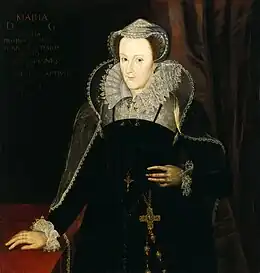

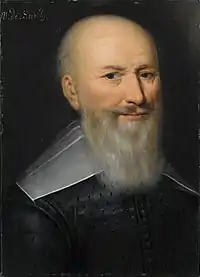




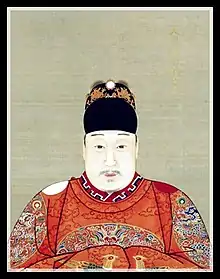




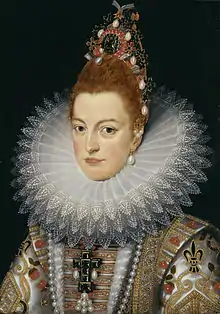
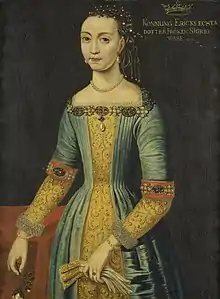
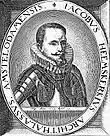
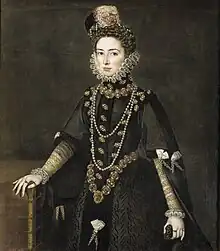
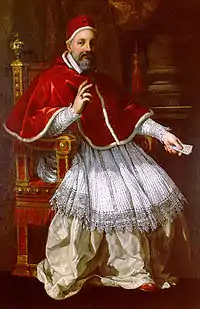


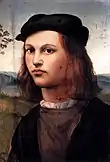

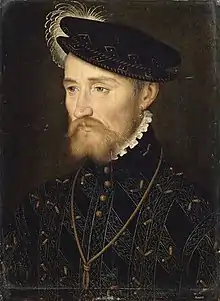
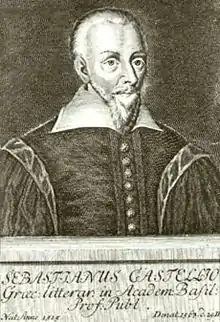
.jpg.webp)
%252C_by_anonymous_-_Museum_Catharijneconvent.jpg.webp)
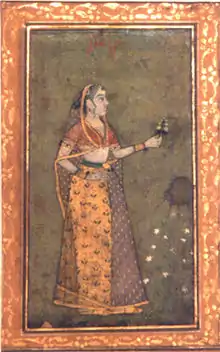
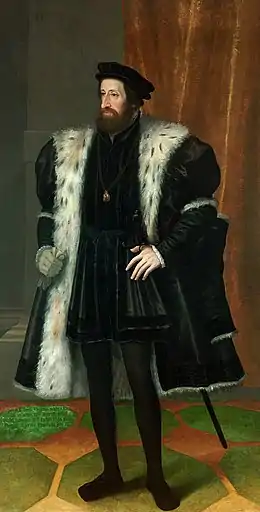


_Effigies_pr%C3%A6positorvm_generalivm_societatis_Iesv_(serietitel)%252C_RP-P-1910-4016.jpg.webp)



